本文基于 https://www.zakon.org/robert/internet/timeline/
这篇文章的时间线的架构还是不错,所以整体基于他的文章架构来进行一些阐述,当然如果只是翻译为中文,意义并不是特别大,因为这里涉及众多的事件和人物,有的也没有阐述的很清楚或者标记清楚,这样对于中国人读这个或者了解不深入的人来说理解也比较困难。所以文章做了很多注解和相关的链接工作。
同时如果全中文翻译,基本你是找不到原始的一些资料的,里面涉及到很多简写,缩写以及专业术语等,同时还有了解一些当时的背景情况。比如cold war
Hobbes' Internet Timeline 25
Hobbes' Internet Timeline 25
bywith support from
Interested in having Hobbes, a former White House Presidential Innovation Fellow,
speak on the history of Internet technology and innovation at your event? email hobbes –at– zakon.org
对前白宫总统创新研究员霍布斯感兴趣,在你的活动中谈论互联网技术和创新的历史? 给Hobbes 发电子邮件。 zakon.org
Hobbes的互联网时间线版权所有(c)1993-2018,作者:Robert H Zakon。 Permission is granted for use of this document in whole or in part for non-commercial purposes
as long as this Copyright notice and a link to this document, at the archive listed at the end,
is included. A copy of the material the Timeline appears in is requested. For commercial uses,
please contact the author first. Links to this document are welcome after e-mailing the author
with the document URL where the link will appear. Hosting of the Timeline on other public Internet
sites is not permitted.
只要包含本版权声明和本文件的链接(位于最后列出的档案馆),则允许将本文件的全部或部分用于非商业目的。
请求时间线所在材料的副本。对于商业用途,请先联系作者。在通过电子邮件向作者发送链接所在的文档URL后,欢迎链接到此文档。
不允许在其他公共互联网网站上托管时间线。
本文:author: aozhejin 有大量删改,原文保留,如有不妥请联系本人。 另外很多人物、事件都有相关的链接和批注等。
在阅读本篇文章之前,最好结合着我的另一篇:https://www.cnblogs.com/aozhejin/p/16387711.html ,同时下面涉及到的简写和公司等
相关机构
|
ARPA,是美国于1958年4月23日在国防部 (简称DoD) 内组建的高级研究计划署 (实际是应对前苏联,属于冷战时期的产物,也是军方的产物可以说。) ARPAnet中文翻译为阿帕网是美国国防部高级研究计划署开发的世界上第一个运营的封包交换网络,它是全球互联网的始祖(鼻祖,互联网起源等)。1969年11月,美国国防部高级研究计划管理局( ARPA 全称: Advanced Research Projects Agency )开始建立一个命名为ARPAnet的网络,从某种意义来说他是冷战后的产物。是第一个世界范围内运行的网络。 ARPAnet是Internet名称的起源。它使用了Internet protocol。ARPANET = Advanced Research Projects Agency Network. DARPA 即国防高级研究计划局( DARPA ) 是美国国防部的一个研发机构,负责开发供军方使用的新兴技术。 |
互联网之父(JCR Licklider)
| 1962 年 8 月麻省理工学院的 JCR Licklider 撰写的一系列备忘录,讨论了他的“银河网络”概念。他设想了一套全球互联的计算机(区别于哈佛 IBM Mark I),每个人都可以通过这些计算机快速访问任何站点的数据和程序。在精神上,这个概念很像今天的互联网。JCR Licklider 从 1962 年 10 月开始担任 DARPA 计算机研究项目的第一任负责人。最早提出全球互联网的人。 |
Lawrence (Larry) G. Roberts
| 称为互联网四父之一,有时候也称为阿帕网之父(father of the ARPANET) |
Raymond Samuel Tomlinson
| ,1941 年 4 月 23 日 - 2016 年 3 月 5 日)是一位美国计算机程序员,他于 1971 年在互联网的前身ARPANET系统上实现了第一个电子邮件程序,他因发明了TCP三向握手而受到赞誉,该握手是HTTP和许多其他关键Internet协议的基础。 |
Steve Crocker
| 关于Stephen D. Crocker,他是Request for Comments系列的发明者,编写了第一个RFC文档等等,Steve Crocker 自 Internet 社区成立以来一直在工作。作为 1960 年代加州大学洛杉矶分校的一名研究生,他是开发ARPANET协议的团队的一员,该协议是当今Internet的基础。由于这项工作,克罗克获得了 2002 年IEEE 互联网奖.Steve Crocker 在创建 ARPA“网络工作组”方面发挥了重要作用,后来成为IETF创建的背景.他还曾担任IETF安全领域主管、互联网架构委员会成员、ICANN安全与稳定咨询委员会主席、ICANN 董事会成员和主席、互联网协会董事会成员以及许多其他与互联网相关的志愿者职位. |
| Wesley Allison Clar,个人电脑之父之一……他是林肯实验室TX-0和TX-2的设计师。 https://www.digibarn.com/stories/linc/documents/LINC-Personal-Workstation/LINC-Personal-Workstation.pdf Wesley A. Clark是 TX-2 的首席架构师 |
TX-2 Computer
| 是林肯实验室开发的,林肯实验室相对比较低调,但是确毫不逊色于贝尔工作室 https://www.ll.mit.edu/sites/default/files/page/doc/2018-05/LookingBack_19_1.pdf 了解林肯实验室可点 这里 TX-2 计算机是林肯TX-0的继任者,以其在推进人工智能和人机交互方面的作用而闻名。Wesley A. Clark是 TX-2 的首席架构师 Tx-2的一些文档: http://www.bitsavers.org/pdf/mit/tx-2/ 也看看他的历史: https://gunkies.org/wiki/TX-2 |
注:另外英文人名尽量不翻译,否则会导致更多的问题。例如:名字不匹配或查询此人等情况,同时查杰出人士也需要一些技巧,否则得不到你想要的结果包括关联查询等,否则内容不一定是你想要的。
1950s
- 1957
- USSR(苏联) launches Sputnik, first artificial earth satellite. In response, US forms the Advanced Research Projects Agency (ARPA), the following year, within the Department of Defense (DoD) to establish US lead in science and technology applicable to the military (:amk:)
- 1957年,10月4日苏联发射了第一颗人造地球卫星 Sputnik 1 。作为回应,美国于1958年4月23日在国防部 (DoD) 内成立了高级研究计划署 ( ARPA ),以确立美国在适用于军事的科学技术方面的领先地位

- 1961(重大事件来说是理论阶段)
- Leonard Kleinrock, MIT(麻省理工学院): "Information Flow in Large Communication Nets" (May 31)
- First paper on packet-switching (PS) theory
- 第一篇关于分组交换 (PS) 理论的论文
- 目前Leonard Kleinrock 教授是加州大学洛杉矶分校计算机科学系特聘教授,简单bio点这里
-

Leonard Kleinrock 教授是加州大学洛杉矶分校计算机科学杰出教授。 在 1960 年至 1962 年期间,他在麻省理工学院攻读研究生期间开发了数据网络的数学理论,这是互联网的基础技术。
- 1962(网络概念阶段)
- J.C.R. Licklider & W. Clark, MIT: "On-Line Man Computer Communication" (August)
- JCR Licklider 和 W. Clark,麻省理工学院 “在线人机通信”(8 月)
-
- Galactic Network concept encompassing distributed social interactions
- 包含分布式社交互动的 银河网络概念
这个阶段是实验非常丰富的阶段包括
Ivan Sutherland (他聘请到 ARPA 工作的计算机图形专家)使用TX-2 计算机编写 Sketchpad,这是计算机辅助设计图形程序的起源。
JCR Licklider 撰写了关于他的Galactic Network概念的备忘录
Leonard Kleinrock 在麻省理工学院完成了他关于通信网络排队论的博士论文Joseph Carl Robnett Licklider(缩写 J.C.R.Licklider)博士(互联网之父)
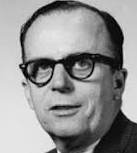
他的名字在不同资料中不尽相同 J.C.R.Licklider, JCR.Licklider,全名为 Joseph Carl Robnett Licklider等
1962 年,Joseph Carl Robnett Licklider 博士在一系列讨论“星际计算机网络”的备忘录中提出了全球网络的最早概念
这里有关于 J.C.R. Licklider在互联网名人堂得主的介绍,已过世。他被称为互联网之父(四父之一)。被认为是成为计算机发展和通用计算机史上最杰出的人物之一。Clark和 Joseph Licklider(J.C.R. Licklider) 于 1962 年发表了一份名为“在线人机通信”的文件,其中概述了一个名为银河网络的想法,它类似于互联网。Licklider 是 ARPANet 早期的一位关键工程师,他认为是 Clark 向他介绍了计算机。W. Clark全名 Welden E. Clark (来自bbn公司)
-
On-line man-computer communication 可参考这里 或 这里
论文地址
https://dl.acm.org/doi/pdf/10.1145/1460833.1460847
1963年- Joseph Carl Robnett Licklider starts to talk with Larry Roberts of Lincoln Labs, director of the TX-2 project, Ivan Sutherland, a computer graphics expert whom he has hired to work at ARPA and Bob Taylor, who joins ARPA in 1965. Lick contracts with MIT, UCLA, and BBN to start work on his vision.
- Joseph Carl Robnett Licklider 开始与 MIT Lincoln Lab(林肯实验室) 的Larry Roberts、TX-2项目负责人、伊万·萨瑟兰(Ivan Sutherland)和鲍勃·泰勒(Bob Taylor)进行交谈。伊万·萨瑟兰(Ivan Sutherland)是计算机图形专家,他受雇于ARPA工作,鲍勃·泰勒(BobTaylor)于1965年加入ARPA。利克与麻省理工学院、加州大学洛杉矶分校和BBN签订合同,开始他的愿景工作。
| 人名 | 简介 |
| Joseph Carl Robnett Licklider | |
| Larry Roberts | |
| Ivan Sutherland | |
| Bob Taylor |
1964(试验阶段)- RAND(著名的兰德公司)的Paul Baran: "On Distributed Communications Networks"
-
Packet-switching networks; no single outage point
分组交换网络;无单一停机点 - 同时也参考下关于Paul Baran和互联网的起源点这里
- 1964年,美国RAND(兰德公司)的 Paul Baran 和英国国家物理实验室(NPL) 的Donald Davies于1965年首次独立探索了切换小块数据的概念。这个阶段 Paul Baran、Donald Davies、Leonard Kleinrock 和其他人进行了平行研究。Baran 是最早发布 On Data Communications Networks 的人之一。Leonard Kleinrock的论文也作为关于排队论的开创性著作发表。
Multics 操作系统(所有操作系统的雏形,影响了所有现代操作系统,从微型计算机到大型机)1964 年,Multics操作系统最初是为 GE-645 大型机(一个 36 位系统)开发的。GE 的计算机业务,包括 Multics,于 1970 年被霍尼韦尔收购;1973 年左右,霍尼韦尔 6180 机器支持 Multics,其中包括安全改进,包括对保护环的硬件支持。
(中间的故事:Licklider 离开 ARPA 回到 MIT,Ivan Sutherland 搬到 IPTO。在 IPTO 的资助下,麻省理工学院的 MAC 项目获得了一台 GE-635 计算机,并开始开发 Multics 分时操作系统)
后来,1967年随着Ritchie(C语言之父) 和Ken Thompson等加入贝尔实验室,他们从事了开发Multics操作系统的相关研发工作。贝尔实验室于 1969 年退出了该项目;一些在那里工作的人继续创建Unix系统。麻省理工学院和通用电气继续开发 Multics。
- IBM System/360 ( S/360 ) 是IBM于 1964 年 4 月 7 日宣布的大型机计算机系统系列模型,并于 1965 年至 1978 年间持续交付。
-
- 1965(实验成功阶段)
- ARPA(计划署) sponsors study on "cooperative network of time-sharing computers"
- TX-2 at MIT Lincoln Lab and AN/FSQ-32 at System Development Corporation (Santa Monica, CA) are directly linked (without packet switches) via a dedicated 1200bps phone line; (DEC公司 computer at ARPA later added to form "The Experimental Network"
DEC 推出了第一台商业上成功的小型计算机 PDP-8。它小到可以放在桌面上,售价为 18,000 美元——是低端 IBM/360 大型机成本的五分之一。速度、尺寸和成本的结合使微型计算机能够在数千个制造工厂、办公室和科学实验室中建立。在 ARPA 的资助下,Larry Roberts 和 Thomas Marill 创建了第一个广域网连接。他们通过带有声耦合器的专用电话线将麻省理工学院的 TX-2 与圣莫尼卡的 Q-32 连接起来。该系统证实了星际网络研究人员的怀疑,即电话线用于数据, - 林肯实验室于 1965 年 10 月使用了 TX-2 固体计算机与 Q-32 原型机相连,用于第一个时间包通信。
补充:
Tx-2计算机是在林肯实验室开发出来的,具体可以到 TX-2 链接去查看pdf
Digital Equipment Corporation ( DEC),使用商标 Digital ,是1960 年代至 1990 年代计算机行业的主要美国公司。该公司由Ken Olsen和Harlan Anderson于 1957年共同创立。Olsen 一直担任总裁,直到 1992 年公司急剧下滑后被迫辞职。 : 如果你在百度搜索 Tx-2 那真是无可奈何,基本是搜不到什么有用的关于Tx-2的信息。也是无语了。
: 如果你在百度搜索 Tx-2 那真是无可奈何,基本是搜不到什么有用的关于Tx-2的信息。也是无语了。
AN/FSQ-32 是由IBM制造,这里介绍的比较详细,而且可以看到https://en.wikipedia.org/wiki/AN/FSQ-32
http://www.ed-thelen.org/comp-hist/BRL61-a.html - TX-2 at MIT Lincoln Lab and AN/FSQ-32 at System Development Corporation (Santa Monica, CA) are directly linked (without packet switches) via a dedicated 1200bps phone line; (DEC公司 computer at ARPA later added to form "The Experimental Network"
- 1966
- Lawrence G. Roberts, MIT: "Towards a Cooperative Network of Time-Shared Computers" (October)
-
MIT(麻省理工学院) 的 Lawrence G. Roberts (也称为互联网之父)领导建立了分时计算机协作网络
- First ARPANET plan (第一个ARPANET计划)
- Lawrence Roberts 与 J.C.R 同效力过ARPANT,所以都称为互联网之父,也称为阿帕网(ARPANET)之父 请点Lawrence G. Roberts,可以让您了解更多当时的设计情况
- ARPANET是互联网的前身、鼻祖。(这里有介绍从ARPANET到World Wide Web)
- www又称万维网。
- 1967
- ARPANET design discussions held by Larry Roberts at ARPA IPTO PI meeting in Ann Arbor, Michigan (April)
- ACM Symposium(研讨会) on Operating Systems Principles in Gatlinburg, Tennessee (October)
-
Larry Roberts在密歇根州安娜堡举行的ARPA IPTO PI会议上举行的ARPANET设计讨论(4月)
在田纳西州加特林堡举行的 ACM 操作系统原理研讨会(10月)
- First design paper on ARPANET published by Lawrence G. Roberts: "Multiple Computer Networks and Intercomputer Communication"
- 下面是是该论文的的架构内容包括硬件接口和存储以及网络协议。

- First meeting of the three independent packet network teams (三个团队分别是RAND公司, NPL实验室, ARPA计划署)
- 三个独立的分组网络团队的第一次会议。
- Larry Roberts convenes a conference in Ann Arbor, Michigan, to bring the ARPA researchers together. At the conclusion, Wesley Clark suggests that the network be managed by interconnected ‘Interface Message Processors’ in front of the major computers. Called IMPs, they evolve into today’s routers.
Larry Roberts 在密歇根州安娜堡召开会议,将 ARPA 研究人员聚集在一起。最后,Wesley Clark 建议网络由主要计算机前面的互连“接口消息处理器”管理。它们被称为 IMP,它们演变成今天的路由器。
- NPL in Middlesex, England develops NPL Data Network under Donald Watts Davies who coins the term packet. The NPL network, an experiment in packet-switching, used 768kbps lines
- 英国米德尔塞克斯郡的国家物理实验室(NPL)在唐纳德·瓦茨·戴维斯(DonaldWatts Davies)的领导下开发了NPL数据网络,他创造了 packet-switching。在分组交换(packet-switching)实验的NPL网络中使用768kbps线路
- Macromodular computer systems by WESLEY A. CLARK Chairman's Introduction Washington University St. Louis, Missouri
华盛顿州克拉克,“宏模块计算机系统”,Proc。SJCC(1967 年 4 月)
论文地址: https://dl.acm.org/doi/pdf/10.1145/1465482.1465536 -
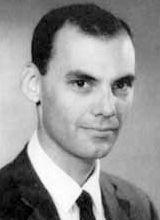
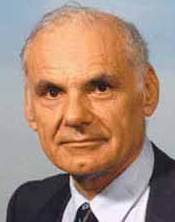
上面图片是两张一个是年轻时候、一个是功成名就时的照片。
Larry Roberts 有时被称为阿帕网之父,因为它指导和创建了ARAPNET工程师团队的创建,同时Larry Roberts也是ARAPNET的架构师。
Larry Roberts 即 Lawrence G. Roberts,百科中是用Lawrence G. Roberts ,
Lawrence Roberts,全名Lawrence Gilman Roberts.
他的名字是有点乱的,这里是 Lawrence (Larry) G. Roberts
这里有一个介绍互联网十大先锋人物的 https://www.ibiblio.org/pioneers/index.html 介绍用的名字是 Larry Roberts有兴趣可以仔细看下。
他也入选互联网名人堂(介绍时候用的名字是Lawrence Roberts) https://www.internethalloffame.org/inductees/lawrence-roberts
他的名字给本文造成了一定的理解上的问题。 - 1968 By the end of July 1968, a Request for Quotation (RFQ) [32] for the network IMPs was mailed to 140 potential bidders. The 19-node example to be delivered by the contractor is shown in Fig. 1 来源点这里
- 到1968年7月底,网络IMP的报价邀请函(RFQ)[32] 已邮寄给140个潜在投标人。承包商交付的19-node示例如图1所示

- 1968
- PS-network presented to the Advanced Research Projects Agency (即ARPA计划署)
PS-network代表ARPA - Request for quotation for ARPANET (29 Jul) sent out in August; responses received in September
- 8月发出的ARPANET(7月29日)报价请求;9月份收到的答复
- University of California Los Angeles (UCLA即洛杉矶加利福尼亚大学) awarded Network Measurement Center contract in October
- Network Working Group (NWG), headed by Steve Crocker, loosely organized to develop host level protocols for communication over the ARPANET.
- Tymnet built as part of Tymshare service(Tymnet是Tymshare服务的一部分)
- 1969
- Bolt Beranek and Newman, Inc. (BBN是联合公司) awarded Packet Switch contract to build Interface Message Processors (IMPs) in January
- IMPS解释:中文为接口消息处理器, IMPs 是从 1960 年代后期到 1989 年用于将参与网络互连到ARPANET的分组交换 节点,九十年代之后APRANET退出历史舞台。
具体请看: https://en.wikipedia.org/wiki/Interface_Message_Processor 这里有更多有价值的信息。 - US Senator Edward Kennedy sends a congratulatory telegram to BBN公司 for its million-dollar ARPA contract to build the "Interfaith" Message Processor, and thanking them for their ecumenical efforts ARPANET commissioned by DoD(美国国防部) for research into networking
- 美国参议员爱德华·肯尼迪向 BBN公司发来贺电, 祝贺他们以百万美元与ARPA 签约建造“Interfaith” 信息处理器,并感谢他们的大公无私的努力。国防部委托的ARPANET用于网络研究。
- Nodes are stood up as BBN builds each IMP [ Honeywell DDP-516 mini computer with 12K of memory]; AT&T provides lines bundled to 50kbps
- 当 BBN 构建每个IMP(Honeywell DDP-516微型计算机,内存为12K)时,节点被竖立起来;AT&T提供捆绑到50kbps的线路
- 下面是涉及的4个节点
- Node 1: 加州大学洛杉矶分校(8 月 30 日,9 月 2 日上线)
- Function: Network Measurement Center
- 功能: 网络测量中心
- 系统、操作系统: SDS SIGMA 7、SEX
- Diagram of the first host to IMP connection (第一个主机到 IMP 连接示意图)
- Node 2: 斯坦福研究所 (SRI)(10 月 1 日)
- 网络信息中心 (NIC)
- SDS940/Genie
- Doug Engelbart 的“人类智力增强”的项目
- Node 3: 加州大学圣巴巴拉分校 (UCSB)(11 月 1 日)
- Culler-Fried 交互式数学
- IBM 360/75,操作系统/MVT
- Node 4: 犹他大学(12 月)
- Graphics(图形)
- DEC PDP-10, Tenex
- Diagram of the 4-node ARPAnet
- RFC诞生
-
首次征求意见 (RFC):Steve Crocker 的“主机软件”(4 月 7 日)RFC 4: Network Timetable ()First packets sent by Charley Kline at UCLA as he tried logging into SRI. The first attempt resulted in the system crashing as the letter G of LOGIN was entered. (October 29) [ Log entry ]UCLA 的 Charley Kline 在尝试登录 SRI 时发送的第一个数据包。第一次尝试导致系统崩溃,因为输入了 LOGIN 的字母 G。(10月29日)[ 日志条目 ]Univ of Michigan, Michigan State and Wayne State Univ establish X.25-based Merit network for students, faculty, alumni 密歇根大学、密歇根州立大学和韦恩州立大学为学生、教师和校友建立了基于 X.25 的 Merit 网络 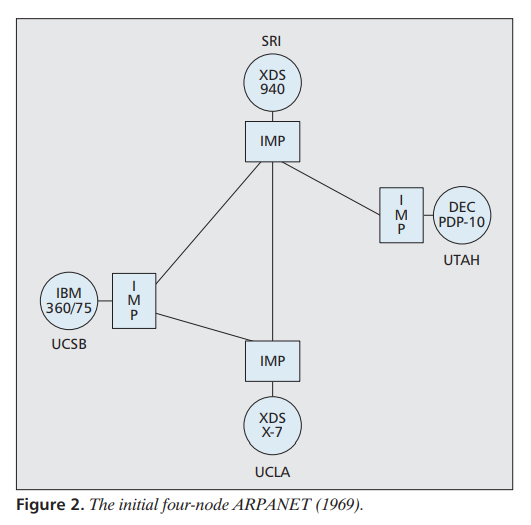
The first real network to run on packet-switching technology. Computers at Stanford and UCLA connected for the first time.
第一个真正使用分组交换技术的网络。斯坦福大学和加州大学洛杉矶分校的计算机首次连接。DEC 推出了第一台商业上成功的小型计算机 PDP-8,它小到可以放在桌面上,售价为 18,000 美元——是低端 IBM/360 大型机成本的五分之一。在 ARPA 的资助下,Larry Roberts 和 Thomas Marill 创建了第一个广域网连接。他们通过带有声耦合器的专用电话线将麻省理工学院的 TX-2 与圣莫尼卡的 Q-32 连接起来。该系统证实了星际网络研究人员的怀疑,即电话线用于数据,但效率低下,浪费带宽,并且昂贵。正如 Kleinrock 预测的那样,分组交换为计算机之间的通信提供了最有前途的模型。
1969年9月29日 关于Fairchild(飞兆半导体公司) 3708的论文 这是世界上第一款采用硅栅技术的商业集成电路,由费德里科·法金于1968年在Fairchild设计

- 1970
- First publication of the original ARPANET Host-Host protocol: C.S. Carr, S. Crocker, V.G. Cerf, "HOST-HOST Communication Protocol in the ARPA Network," in AFIPS Proceedings of SJCC
- 原始 ARPANET Host-Host 协议的首次发表:CS Carr、S. Crocker、VG Cerf,“ ARPA 网络中的 HOST-HOST 通信协议”,在 SJCC 的 AFIPS Proceedings 中
- 可以查看:
- https://dl.acm.org/doi/pdf/10.1145/1476936.1477024
https://apps.dtic.mil/sti/citations/AD0757680
这三个人介绍一下:
C.S. Carr,
S. Crocker即Steve Crocker
V.G. Cerf :
https://www.gangalib.org/cerfvita.php - First report on ARPANET at AFIPS: "Computer Network Development to Achieve Resource Sharing" (March)
- ALOHAnet, the first packet radio network, developed by Norman Abramson, Univ of Hawaii(系统), becomes operational (July)
- AFIPS 关于 ARPANET 的第一份报告:“计算机网络开发实现资源共享”(3 月)
- 夏威夷大学Norman Abramson(系统) 开发的第一个分组无线电网络ALOHAnet投入使用(7 月)
- 1972 年连接到阿帕网
- 1972 年连接到阿帕网
- ARPANET hosts start using Network Control Protocol (NCP), first host-to-host protocol
ARPANET 主机开始使用网络控制协议(NCP),第一个主机到主机协议 - First cross-country link installed by AT&T between UCLA and BBN at 56kbps. This line is later replaced by another between BBN and RAND. A second line is added between MIT and Utah
- AT&T在UCLA和 BBN 之间以 56kbps 的速度安装了第一条跨国链路。这条线后来被 BBN 和 RAND 之间的另一条线所取代。在麻省理工学院和犹他州之间增加了第二条线路
补充:
AFIPS 是美国信息处理学会联合会(AFIPS) 是专业学会的伞式组织,成立于 1961 年 5 月 10 日,于 1990 年解散。其使命是促进信息科学领域的知识,并在国际上代表其成员学会论坛。 - 1971
- 15 nodes (23 hosts): UCLA , SRI, UCSB, Univ of Utah, BBN, MIT, RAND, SDC, Harvard, Lincoln Lab, Stanford, UIU(C), CWRU, CMU, NASA/Ames
BBN(公司) starts building IMPs using the cheaper Honeywell 316(计算机). IMPs however are limited to 4 host connections, and so BBN develops a terminal IMP (TIP) that supports up to 64 terminals (September)
- BBN(公司)开始使用更便宜的Honeywell 316(计算机)构建 IMP。然而,IMP 仅限于 4 个主机连接,因此 BBN 开发了一个终端 IMP ( TIP ),最多支持 64 个终端(9 月)
- Ray Tomlinson of BBN invents email program to send messages across a distributed network. The original program was derived from two others: an intra-machine email program (SENDMSG) and an experimental file transfer program (CPYNET)
BBN 的 Ray Tomlinson 发明了通过分布式网络发送消息的电子邮件程序。原始程序源自另外两个程序:机器内电子邮件程序 ( SENDMSG ) 和实验性文件传输程序 (CPYNET) - Project Gutenberg is started by Michael Hart with the purpose of making copyright-free works, including books, electronically available. The first text is the US Declaration of Independence
-
Ray Tomlinson  Raymond Samuel Tomlinson,1941 年 4 月 23 日 - 2016 年 3 月 5 日)是一位美国计算机程序员,他于 1971 年在互联网的前身ARPANET系统上实现了第一个电子邮件程序; 这是第一个能够在连接到ARPANET 的不同主机上的用户之间发送邮件的系统。以前,邮件只能发送给使用同一台计算机的其他人。为了实现这一点,他使用@符号将用户名与他们的机器名称分开,这种方案从那时起就一直用于电子邮件地址。
Raymond Samuel Tomlinson,1941 年 4 月 23 日 - 2016 年 3 月 5 日)是一位美国计算机程序员,他于 1971 年在互联网的前身ARPANET系统上实现了第一个电子邮件程序; 这是第一个能够在连接到ARPANET 的不同主机上的用户之间发送邮件的系统。以前,邮件只能发送给使用同一台计算机的其他人。为了实现这一点,他使用@符号将用户名与他们的机器名称分开,这种方案从那时起就一直用于电子邮件地址。互联网名人堂在对他的工作的描述中评论道:“汤姆林森的电子邮件程序带来了一场彻底的革命,
从根本上改变了人们交流的方式”。他因发明了TCP三向握手而受到赞誉,
该握手是HTTP和许多其他关键Internet协议的基础Michael Hart 是一位美国作家,最著名的是电子书的发明者和古腾堡计划(PG)的创始人,
这是第一个制作电子书的项目可通过Internet免费获得。他在互联网存在之前几年就通过ARPANET、
以及后来的BBS网络和Gopher 服务器发表了电子书。哈特在 1971 年创立 PG 后,
毕生致力于数字化和分发公共领域作品中的文学作品Honeywell 316 参看:
https://www.old-computers.com/museum/computer.asp?st=1&c=9271971 年 1 月成功开发世界上第一台微处理器Intel 4004 ,Faggin于 1996 年将其捐赠给了硅谷的计算机历史博物馆。
1971年10月 Ray Tomlinson(电子邮件之父)发明电子邮件,1972年对其进行了改进,以包括多个用户。Internet电子邮件由三个组件组成,即消息信封、消息头和消息正文。
- 1972
- Ray Tomlinson (BBN公司员工) modifies email program for ARPANET where it becomes a quick hit. The @ sign was chosen from the punctuation keys on Tomlinson's Model 33 Teletype for its "at" meaning (March)
Larry Roberts(又名Lawrence (Larry) G. Roberts) writes first email management program (RD) to list, selectively read, file, forward, and respond to messages (July)
Larry Roberts编写了第一个电子邮件管理程序(RD),用于列出、选择性阅读、归档、转发和回复邮件(1972年7月)- International Conference on Computer Communications (ICCC) at the Washington D.C. Hilton with demonstration of ARPANET between 40 machines and the Terminal Interface Processor (TIP) organized by Bob Kahn. (October)
- 由Bob Kahn组织的在华盛顿希尔顿举行的计算机通信国际会议(ICCC),展示40台机器和终端接口处理器(TIP)之间的ARPANET。(1972年10月)
- First computer-to-computer chat takes place at UCLA, and is repeated during ICCC, as psychotic PARRY (at Stanford) discusses its problems with the Doctor (at BBN).
第一次计算机对计算机的聊天发生在UCLA(加州大学洛杉矶分校),并在ICCC会议期间重复,作为精神病患者帕里(斯坦福)与医生讨论其问题(在BBN)。通过ARPANET进行对话的截图。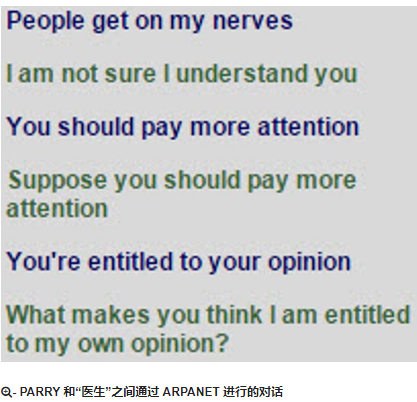
- 这次会议可以说是里程碑式的存在,被定义为互联网的起源。
- International Network Working Group (INWG) formed in October as a result of a meeting at ICCC identifying the need for a combined effort in advancing networking technologies. Vint Cerf appointed first Chair. By 1974, INWG became IFIP WG 6.1 (:vgc:)
- Louis Pouzin leads the French effort to build its own ARPANET - CYCLADES
- RFC 318: Telnet specification
-
Ray Tomlinson(他以发明电子邮件而知名,誉为电子邮件之父) 的简短传记来自:互联网名人堂
1967年,他加入了传奇的研发公司Bolt Beranek and Newman(现为Raytheon BBN Technologies)。在 BBN,他帮助开发了 TENEX 操作系统,包括 ARPANET 和 TELNET 协议的实现。1971 年,他通过结合 SNDMSG 和 CPYNET 程序开发了 ARPANET 的第一个网络电子邮件应用程序,允许将消息发送给其他计算机上的用户。Tomlinson 开发了“user@host”约定,他选择了@ 符号来区分邮寄地址中的本地和全球电子邮件。个人对个人的网络电子邮件诞生了,user@host成为电子邮件地址的标准,直到今天仍然如此。
来自: https://www.internethalloffame.org/official-biography-raymond-tomlinsonBob Kahn介绍
他与Vint Cerf一起首先提出了传输控制协议(TCP) 和互联网协议(IP),它们是互联网核心的基本通信协议
2004 年,Kahn 与 Vint Cerf 一起获得了图灵奖,以表彰他们在 TCP/IP 方面的工作
来自:https://en.wikipedia.org/wiki/Bob_Kahn
ICCC介绍第一届计算机通信国际会议于1972 年 10 月 24 日至 26 日在华盛顿特区华盛顿希尔顿酒店举行。它由BBN Technologies在Bob Kahn的指导下组织,是计算机网络技术和功能以及ARPANET项目产品的首次公开演示之一。
IPTO主任Lawrence Roberts将担任会议主席,他认为 ICCC 将是展示 ARPANET 能力的理想场所。在麻省理工学院教授Al Vezza的帮助下,Khan 获得了全国各地与 ARPANET 合作的科学家和学生的帮助。希尔顿酒店安装了终端接口处理器,通过 AT&T 安装的专用电话线连接到ARPANET,然后连接到地板上设置的数十个终端。会议于 22 日以贵宾招待会开始,并于 24 日开幕。ARPANET 演示取得了“令人兴奋”的成功,将与会者连接到全国和国外的系统,让他们参与各种活动,包括与空中交通管制系统互动和下棋。演示的成功推动了ARPANET(阿帕网)的使用和扩展的加速,使网络更接近于成为现代互联网
来自:https://en.wikipedia.org/wiki/International_Conference_on_Computer_Communications
INWG介绍
国际网络工作组(INWG) 是 1970 年代一群杰出的计算机科学研究人员,他们研究和开发了计算机网络的标准和协议。它成立于 1972 年,作为一个非正式小组来考虑连接不同网络所涉及的技术问题,并于当年晚些时候成为国际信息处理联合会的一个小组委员会。该小组成员提出的想法促成了Bob Kahn和Vint Cerf在 1974 年 提出的原始“分组网络互通协议”
这些国际工作导致了 1984 年的OSI 模型(我们经常说的OSI七层模型,OSI是以协议为中心的),INWG 的许多成员成为其中的倡导者
INWG 持续致力于协议设计和正式规范,直到 1990 年代随着Internet的快速发展而解散。 虽然解散了,但是对于当时的历史背景下,推动整个
来自: https://en.wikipedia.org/wiki/International_Networking_Working_Group关于OSI模型(我们经常说的网络OSI七层模型)
OSI 模型的发展始于 1970 年代后期,以支持各种计算机网络方法的出现,例如当前被称为 TCP/IP 的主要方法,它们在世界大型国家网络工作中竞争应用。在 1980 年代,该模型成为国际标准化组织(ISO) 开放系统互连小组的工作产品。虽然试图提供对网络的全面描述,但该模型未能在Internet设计期间获得依赖,这反映在主要由Internet 工程任务组(IETF) 赞助的不太规范的Internet 协议套件中。),具体查看
https://en.wikipedia.org/wiki/OSI_model是由成员国国家标准组织的代表组成的国际标准制定组织,该组织成立于 1947 年 2 月 23 日,致力于开发和发布除电气和电子工程之外的所有技术和非技术领域的标准化。总部位于瑞士日内瓦,截至 2022 年,其业务遍及 167 个国家。ISO 的三种官方语言是英语、法语和俄语(注意我们在查计算机工程的时候实际看到他隶属于电气行业范畴)
今天被称为 ISO 的组织始于 1926 年,当时是国家标准化协会国际联合会( ISA ),主要关注机械工程。ISA 于 1942 年在二战期间暂停;然而,战后,最近成立的联合国标准协调委员会 (UNSCC) 与 ISA 接洽,提议成立一个新的全球标准机构。
1946 年 10 月,来自 25 个国家的 ISA 和 UNSCC 代表在伦敦会面,同意联手创建国际标准化组织。该组织于 1947 年 2 月 23 日正式开始运作
具体查看: https://en.wikipedia.org/wiki/International_Organization_for_Standardization - 1973
- First international connections to the ARPANET: University College of London (England) via NORSAR (Norway)
- Bob Metcalfe's Harvard PhD Thesis outlines idea for Ethernet. The concept was tested on Xerox PARC's Alto computers, and the first Ethernet network called the Alto Aloha System (May)
- Bob Kahn poses Internet problem, starts Internetting research program at ARPA. Vinton Cerf sketches gateway architecture in March on back of envelope in a San Francisco hotel lobby
- Cerf and Kahn present basic Internet ideas at INWG in September at Univ of Sussex, Brighton, UK
- RFC 454: File Transfer specification
- Network Voice Protocol (NVP) specification (RFC 741) and implementation enabling conference calls over ARPAnet.
- SRI (NIC) begins publishing ARPANET News in March; number of ARPANET users estimated at 2,000
- ARPA study shows email composing 75% of all ARPANET traffic
- NVP的协议规范说的就是RFC 741,通过ARPAnet实现电话会议。SRI(NIC)于3月开始发布ARPANET新闻;ARPANET用户数量估计为2000。ARPA研究显示,电子邮件占所有ARPANET流量的75%。
- Christmas Day Lockup - Harvard IMP hardware problem leads it to broadcast zero-length hops to any ARPANET destination, causing all other IMPs to send their traffic to Harvard (25 December)
- 圣诞节锁定-哈佛IMP硬件问题导致它向任何ARPANET目的地广播零长度跳转,导致所有其他IMP向哈佛发送流量(12月25日)
- RFC 527: ARPAWOCKY
- RFC 602: The Stockings Were Hung by the Chimney with Care
-
1973年 Arpanet首次与伦敦大学学院建立了跨大西洋连接(全球网络开端,以前还只是相当于局域网)
这一年,30 个机构连接到 ARPANET。网络用户范围从工业设施和咨询公司,如 BBN、Xerox PARC 和 MITRE 公司,到政府网站,如 NASA 的 Ames 研究实验室、国家标准局和空军研究机构。
Bob Kahn (Robert Elliot Kahn)从 BBN公司 转到 DARPA(国防高级研究计划局) 为 Larry Roberts 工作,他自己分配的第一个任务是 ARPANET 与其他网络的互连。1973年初,他招募了一直在斯坦福大学任教的 Vint Cerf。问题在于 ARPANET、基于无线电的 PRnet 和 SATNET 都有不同的接口、数据包大小、标签、约定和传输速率。将它们连接在一起非常困难。Bob Kahn 和 Vint Cerf 着手设计一个网络到网络的连接协议。Vint Cerf 领导着新成立的国际网络工作组。1973 年 9 月,两人在英国苏塞克斯大学的一次 INWG 会议上发表了关于新传输控制协议 (TCP早期版本) 的第一篇论文。后来,该协议被分成两个独立的层:主机到主机的通信将由 TCP 处理,而互联网协议(IP) 则处理网际网络通信。两者一起通常被称为 TCP/IP,并构成现代 Internet 基础的一部分
(Larry Roberts 有时被称为阿帕网之父,因为它指导和创建了ARAPNET工程师团队的创建,同时Larry Roberts也是ARAPNET的架构师)与此同时,在 Xerox PARC,Bob Metcalfe 正在研究一种基于 ALOHA 协议的局域网 (LAN) 网络系统。它将成为以太网。
Vinton Cerf Vinton Gray Cerf ( 生于 1943 年 6 月 23 日) 是美国互联网先驱,被公认为“互联网之父”之一,与TCP/IP公司共享这个称号-开发者鲍勃·卡恩。他获得了荣誉学位和奖项,包括国家技术奖章、图灵奖、[总统自由勋章、马可尼奖,美国国家工程院院士。
Cerf于 1973 年至 1982 年在美国国防高级研究计划局(DARPA) 工作,并资助多个小组开发TCP/IP、分组无线电 ( PRNET )、分组卫星 ( SATNET ) 和分组安全技术,推动和领导了INWG的发展
1992 年, Vint Cerf 与 Bob Kahn共同创立了互联网协会,在互联网相关标准、教育和政策方面发挥领导作用
互联网协会网站: https://www.internetsociety.org/ - 1974
- Vint Cerf and Bob Kahn publish "A Protocol for Packet Network Intercommunication" which specified in detail the design of a Transmission Control Program (TCP). [IEEE Trans Comm]
- BBN opens Telenet, the first public packet data service (a commercial version of ARPANET)
Vint Cerf 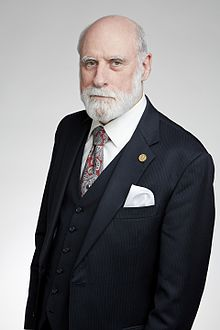 Vinton Gray Cerf ( 生于 1943 年 6 月 23 日) 是美国互联网先驱,被公认为“互联网之父”之一,
Vinton Gray Cerf ( 生于 1943 年 6 月 23 日) 是美国互联网先驱,被公认为“互联网之父”之一,
与TCP/IP公司共享这个称号-开发者Bob Kahn。他获得了荣誉学位和奖项,包括国家技术奖章、图灵奖、
总统自由勋章、马可尼奖,美国国家工程院院士。Bob Kahn  Robert Elliot Kahn,1938 年 12 月 23 日出生,是一位美国电气工程师,
Robert Elliot Kahn,1938 年 12 月 23 日出生,是一位美国电气工程师,
他与Vint Cerf一起首先提出了传输控制协议(TCP) 和互联网协议(IP),它们是互联网核心的基本通信协议.
在从事SATNET卫星分组网络项目时,他提出了后来成为传输控制协议(TCP) 的初步想法,该协议旨在替代ARPANET
中使用的早期网络协议NCP 。TCP 在形成开放架构网络的基础方面发挥了重要作用,
它将允许世界各地的计算机和网络相互通信,而不管每个网络上的计算机使用什么硬件或软件。
为了达到这个目标,TCP 被设计成具有以下特性:- 整个网络的小部分将能够通过仅转发数据包的专用计算机(最初称为网关,现在称为路由器)相互通信。
- 网络的任何部分都不会是单点故障,也无法控制整个网络。
- 通过网络发送的每条信息都将被赋予一个序列号,以确保它们在目标计算机上以正确的顺序进行处理,
并检测其中任何一条的丢失。 - 向另一台计算机发送信息的计算机将知道,当目标计算机针对该特定信息发送回一个称为确认
( ACK ) 的特殊数据包时,该信息已成功接收。 - 如果从一台计算机发送到另一台计算机的信息丢失,则在超时检测到丢失后,将重新传输信息,
这将识别出未收到预期的确认。 - 通过网络发送的每条信息都将附有一个校验和,由原始发送者计算,并由最终接收者检查,
以确保它在途中没有受到任何损坏。
- 1975
- Operational management of Internet transferred to Defense Communications Agency(DCA) (now DISA)
- First ARPANET mailing list, MsgGroup, is created by Steve Walker. Einar Stefferud soon took over as moderator as the list was not automated at first. A science fiction list, SF-Lovers, was to become the most popular unofficial list in the early days
- John Vittal develops MSG, the first all-inclusive email program providing replying, forwarding, and filing capabilities.
- Satellite links cross two oceans (to Hawaii and UK) as the first TCP tests are run over them by Stanford, BBN, and UCL
- "Jargon File(术语文件是计算机程序员使用的词汇表和用法词典)", by Raphael Finkel at SAIL(计算机), first released
Shockwave Rider by John Brunner -
参看:
https://cs.stanford.edu/people/eroberts/courses/soco/projects/1999-00/internet/email.html (The Origins of E-mail,今天叫smtp)
https://www.disa.mil/about/our-history
https://www.techtarget.com/whatis/definition/Defense-Information-Systems-Agency-DISA
https://military-history.fandom.com/wiki/Defense_Information_Systems_AgencyThe first modern email program was developed by John Vittal. The biggest technological advance this program (called MSG) made was the addition of “Reply” and “Forward” functionality.
第一个现代电子邮件程序是由John Vittal开发的。该程序(称为MSG)最大的技术进步是增加了“回复”和“转发”功能。
John Vittal John Vittal 是一名在南加州大学信息科学研究所工作的计算机程序员。他负责将旧的电子邮件系统转变为当今高度用户友好的工具。称为 BANANARD,后来称为新程序 MSG,MSG 是第一个现代电子邮件程序。MSG 包括消息转发、可配置接口和自动创建正确寻址回复的应答命令。 - 1976
- Elizabeth II, Queen of the United Kingdom sends out an email on 26 March from the Royal Signals and Radar Establishment (RSRE) in Malvern
英国女王伊丽莎白二世于3月26日从马尔文皇家信号和雷达机构(RSRE)发出电子邮件。
- UUCP (Unix-to-Unix CoPy) developed at AT&T Bell Labs and distributed with UNIX one year later.
- Multiprocessing Pluribus IMPs are deployed
关于什么是UUCP请参考
https://www.techtarget.com/searchnetworking/definition/UUCP
https://linux.die.net/man/1/uucp - 1977
- THEORYNET(网络项目) created by Larry Landweber at Univ of Wisconsin providing electronic mail to over 100 researchers in computer science (using a locally developed email system over TELENET)
THEORYNET项目由威斯康星州大学的Larry Landweber创建,为100多名计算机科学研究人员提供电子邮件(使用本地开发的TELENET电子邮件系统) - RFC 733: Mail specification
- Tymshare spins out Tymnet under pressure from TELENET. Both go on to develop X.25 protocol standard for virtual circuit style packet switching
Tymshare在TELENET的压力下旋转Tymnet。他们都继续为虚拟电路式分组交换开发X.25协议标准 - First demonstration of ARPANET/SF Bay Packet Radio Net/Atlantic SATNET operation of Internet protocols with BBN-supplied gateways in July
7月,ARPANET/SF Bay分组无线网/大西洋卫星网首次演示使用 BBN 提供的网关运行互联网协议
THEORYNET Landweber 博士(已入选互联网名人堂)在 1977 年的第一个网络项目 TheoryNet 涉及一个面向理论计算机科学家的电子邮件系统。1979年,他提出并领导建立了CSNET(计算机科学网络)项目。CSNET 的目标是为所有美国大学和工业计算机研究小组建立一个网络。到 1984 年,超过 180 所大学、工业和政府计算机科学部门参与了 CSNET。他的团队还开发了第一个 Internet 协议实现(1981-84,IBM VM 系统) Larry Landweber Landweber 博士是国际互联网发展的领导者。1980 年代,他帮助建立了美国与欧洲、亚洲和拉丁美洲国家之间的第一个网络网关。Landweber 通过国际学术网络研讨会(IANW/INET 或“Landweber 会议”)推广 CSNET,该研讨会对来自世界各地的科学家进行了有关如何在其国家实施国家学术和研究网络的教育。这些网络研讨会的参加者是在本国率先发展国家网络的个人,他们帮助加速了互联网的发展
来自 https://www.internethalloffame.org/inductees/larry-landweberCSNET CSNET是Computer Science Network的缩写,是美国国家科学基金会在 1980 年代初期开发的一种计算机网络。该网络允许无法连接到ARPANET的未与国防部进行研究的计算机科学和工程部门连接到他们自己的网络。CSNET 帮助将成千上万的新用户引入了我们今天所知道的互联网,后来在1988 年并入了CREN。
关于CSNET也可以看这里
在 1970 年代后期,大多数美国大学与国防部无关,因此也没有与 ARPANET 连接。然而,他们意识到网络的优势并希望连接到类似的网络。随后,美国国家科学基金会和威斯康星大学麦迪逊分校提出用自己的资金建立一个新的网络来连接非 ARPANET 的计算机科学部门。
1980 年,在 NSF 的额外支持下,组建了一个团队来管理该项目,向该项目和 DARPA 基金会拨款 500 万美元。该团队包括 Landweber、Farber、Peter Denning、Tony Hearn 和 NSF 项目经理 Bill Kern。该奖项的直接后果之一是三所大学(威斯康星-麦迪逊大学、普渡大学和特拉华大学)与成为 CSNET 核心的 ARPANET 建立了联系。
- 1978
- TCP split into TCP and IP (March)
- Possibly the first commercial spam message is sent on 1 May by a DEC marketer advertising an upcoming presentation of its new DECSYSTEM-20 computers
RFC 748: TELNET RANDOMLY-LOSE Option
阿帕网实验于1978年1月3日正式完成,下面是报告内容的一段. 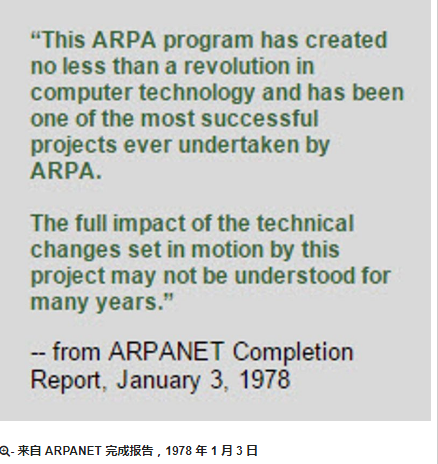
- 1979
- Meeting between Univ of Wisconsin, DARPA, National Science Foundation (NSF), and computer scientists from many universities to establish a Computer Science Department research computer network (organized by Larry Landweber).
- USENET established using UUCP between Duke and UNC by Tom Truscott, Jim Ellis, and Steve Bellovin. All original groups were under NET.* hierarchy.
- First MUD, MUD1, by Richard Bartle and Roy Trubshaw at U of Essex
- ARPA establishes the Internet Configuration Control Board (ICCB)
DARPA 的 Vint Cerf 延续了互联网的愿景,成立了由伦敦大学学院的 Peter Kirstein 担任主席的国际合作委员会和由麻省理工学院的 Dave Clark 担任主席的互联网配置控制委员会(ICCB) - Packet Radio Network (PRNET) experiment starts with DARPA funding. Most communications take place between mobile vans. ARPANET connection via SRI.
- On April 12, Kevin MacKenzie emails the MsgGroup a suggestion of adding some emotion back into the dry text medium of email, such as -) for indicating a sentence was tongue-in-cheek. Though flamed by many at the time, emoticons became widely used after Scott Fahlman suggested the use of :-) and :-( in a CMU BBS on 19 September 1982

- 1980
- ARPANET grinds to a complete halt on 27 October because of an accidentally-propagated status-message virus
- First C/30-based IMP at BBN
-
10月27日,由于意外传播的状态消息病毒,ARPANET完全瘫痪,在BBN第一个基于C/30 的 IMP
- 1981
- BITNET, the "Because It's Time NETwork"
- Started as a cooperative network at the City University of New York, with the first connection to Yale
- Original acronym stood for 'There' instead of 'Time' in reference to the free NJE protocols provided with the IBM systems
- Provides electronic mail and listserv servers to distribute information, as well as file transfers
- CSNET (Computer Science NETwork) built by a collaboration of computer scientists and Univ of Delaware, Purdue Univ, Univ of Wisconsin, RAND Corporation and BBN through seed money granted by NSF to provide networking services (especially email) to university scientists with no access to ARPANET. CSNET later becomes known as the Computer and Science Network.
- C/30 IMPs predominate the network; first C/30 TIP at SAC
- Minitel (Teletel) is deployed across France by France Telecom.
- True Names by Vernor Vinge
- RFC 801: NCP/TCP Transition Plan
BITNET,“因为它是时间网络”
- 作为纽约城市大学的合作网络开始,第一次连接到耶鲁
- 参考 IBM 系统提供的免费 NJE 协议,原始首字母缩写词代表“那里”而不是“时间”
- 提供电子邮件和 listserv 服务器以分发信息以及文件传输
RFC 801: NCP/TCP 过渡计划-
- 1982
- Norway leaves network to become an Internet connection via TCP/IP over SATNET; UCL does the same
- DCA and ARPA establish the Transmission Control Protocol (TCP) and Internet Protocol (IP), as the protocol suite, commonly known as TCP/IP, for ARPANET.
- This leads to one of the first definitions of an "internet" as a connected set of networks, specifically those using TCP/IP, and "Internet" as connected TCP/IP internets.
- DoD declares TCP/IP suite to be standard for DoD
- EUnet (European UNIX Network) is created by EUUG to provide email and USENET services.
- original connections between the Netherlands, Denmark, Sweden, and UK
- Exterior Gateway Protocol (RFC 827) specification. EGP is used for gateways between networks.
挪威通过 SATNET 上的 TCP/IP 离开网络成为互联网连接;伦敦大学学院也这样做DCA 和 ARPA 为 ARPANET 建立了传输控制协议 (TCP) 和 Internet 协议 (IP),作为协议套件,通常称为 TCP/IP。
- 这导致了将“互联网”定义为一组连接的网络,特别是那些使用 TCP/IP 的网络,以及将“互联网”定义为连接的 TCP/IP 互联网。
- DoD 宣布 TCP/IP 套件为 DoD 的标准 (:vgc:)
- 荷兰、丹麦、瑞典和英国之间的原始联系
- 1983
- Name server developed at Univ of Wisconsin, no longer requiring users to know the exact path to other systems
- Cutover from NCP to TCP/IP (1 January)
- No more Honeywell or Pluribus IMPs; TIPs replaced by TACs (terminal access controller)
- Stuttgart and Korea get connected
- Movement Information Net (MINET) started early in the year in Europe, connected to Internet in Sept
- CSNET / ARPANET gateway put in place
- ARPANET split into ARPANET and MILNET; the latter became integrated with the Defense Data Network created the previous year. 68 of the 113 existing nodes went to MILNET
- Desktop workstations come into being, many with Berkeley UNIX (4.2 BSD) which includes IP networking software (:mpc:)
- Networking needs switch from having a single, large time sharing computer connected to the Internet at each site, to instead connecting entire local networks
- Internet Activities Board (IAB) established, replacing ICCB
- EARN (European Academic and Research Network) established. Very similar to the way BITNET works with a gateway funded by IBM-Europe
- FidoNet developed by Tom Jennings
威斯康星大学开发的名称服务器,不再要求用户知道到其他系统的确切路径从 NCP 切换到 TCP/IP(1 月 1 日)不再有 Honeywell 或 Pluribus IMP;TIP 替换为 TAC(终端访问控制器)斯图加特和韩国建立联系运动信息网 (MINET) 于年初在欧洲启动,于 9 月连接到互联网CSNET / ARPANET 网关到位ARPANET 分为 ARPANET 和 MILNET;后者与前一年创建的国防数据网络集成在一起。113 个现有节点中的 68 个转到 MILNET桌面工作站应运而生,其中许多带有包括 IP 网络软件 (:mpc:) 的 Berkeley UNIX (4.2 BSD)网络需求从在每个站点连接到 Internet 的单个大型分时计算机转变为连接整个本地网络互联网活动委员会 (IAB) 成立,取代 ICCBEARN(欧洲学术和研究网络)成立。与 BITNET 与 IBM-Europe 资助的网关的工作方式非常相似汤姆詹宁斯开发的 FidoNet - 1984
- Domain Name System (DNS) introduced
- Number of hosts breaks 1,000
- JUNET (Japan Unix Network) established using UUCP
- JANET (Joint Academic Network) established in the UK using the Coloured Book protocols; previously SERCnet
- Moderated newsgroups introduced on USENET (mod.*)
- Neuromancer by William Gibson
- Canada begins a one-year effort to network its universities. The NetNorth Network is connected to BITNET in Ithaca from Toronto
- Kremvax message announcing USSR connectivity to USENET
域名系统 (DNS) 介绍主机数量突破 1,000使用 UUCP 建立的 JUNET(日本 Unix 网络)使用彩色书协议在英国建立的 JANET(联合学术网络);以前的SERCnet在 USENET (mod.*) 上引入了主持的新闻组威廉·吉布森的《神经漫游者》加拿大开始了为期一年的大学联网工作。NetNorth 网络从多伦多连接到伊萨卡的 BITNET Kremvax 消息宣布苏联连接到 USENET - 1985
- Whole Earth 'Lectronic Link (WELL) started
- Information Sciences Institute (ISI) at USC is given responsibility for DNS root management by DCA, and SRI for DNS NIC registrations
- Symbolics.com is assigned on 15 March to become the first registered domain. Other firsts: cmu.edu, purdue.edu, rice.edu, berkeley.edu, ucla.edu, rutgers.edu, bbn.com (24 Apr); mit.edu (23 May); think.com (24 may); css.gov (June); mitre.org, .uk (July)
- 100 years to the day of the last spike being driven on the cross-Canada railroad, the last Canadian university is connected to NetNorth in a one year effort to have coast-to-coast connectivity.
- RFC 968: 'Twas the Night Before Start-up
Whole Earth 'Lectronic Link (WELL) 启动南加州大学信息科学研究所 (ISI) 由 DCA 负责 DNS 根管理,SRI 负责 DNS NIC 注册Symbolics.com 于 3 月 15 日被分配成为第一个注册域名。其他第一:cmu.edu、purdue.edu、rice.edu、berkeley.edu、ucla.edu、rutgers.edu、bbn.com(4 月 24 日);mit.edu(5 月 23 日);think.com(5 月 24 日);css.gov(六月);mitre.org, .uk(七月)100 年前,在跨加拿大铁路上的最后一个尖峰被驱动的那一天,最后一所加拿大大学与 NetNorth 相连,一年的努力实现了海岸到海岸的连通性。(:kf1:)RFC 968: '那是启动前的夜晚 - 1986
- NSFNET created (backbone speed of 56Kbps)
- NSF establishes 5 super-computing centers to provide high-computing power for all (JVNC@Princeton, PSC@Pittsburgh, SDSC@UCSD, NCSA@UIUC, Theory Center@Cornell).
- This allows an explosion of connections, especially from universities.
- NSF-funded SDSCNET, JVNCNET, SURANET, and NYSERNET operational
- Internet Engineering Task Force (IETF) and Internet Research Task Force (IRTF) comes into existence under the IAB. First IETF meeting held in January at Linkabit in San Diego
- NSFNET 创建(骨干网速度 56Kbps)
- NSF 建立了 5 个超级计算中心,为所有人提供高计算能力(JVNC@Princeton、PSC@Pittsburgh、SDSC@UCSD、NCSA@UIUC、Theory Center@Cornell)。
- 这允许连接爆炸式增长,尤其是来自大学的连接。
- NSF 资助的 SDSCNET、JVNCNET、SURANET 和 NYSERNET 运营 (:sw1:)
- 互联网工程任务组 (IETF) 和互联网研究任务组 ( IRTF ) 在 IAB 下成立。1 月在圣地亚哥的 Linkabit 举行的第一次 IETF 会议
-
互联网相关标准制定组织两标准和一协会
https://www.ietf.org/ 介绍
互联网工程任务组 (IETF) 是首要的互联网标准机构,通过开放流程开发开放标准。
IETF 是一个由网络设计者、运营商、供应商和研究人员组成的大型开放国际社区,关注互联网架构的演进和互联网的顺利运行。IETF 的技术工作在工作组中完成,这些工作组按主题组织成几个领域。大部分工作是通过 邮件列表处理的。IETF 每年召开3 次 会议。
IETF 标准制定过程 对任何有兴趣提供技术贡献的个人开放。
刚接触 IETF 的参与者——即使是以前有互联网技术经验或在其他标准制定机构工作的人——会发现阅读 IETF 入门和 IETF 之道很有帮助。
https://irtf.org/ 介绍
互联网研究任务组(IRTF) 专注于 与 互联网相关的长期研究问题,而平行组织 互联网工程任务组 ( IETF ) 则专注于工程和标准制定的短期问题。IRTF 由多个专注的长期研究小组组成。 这些小组致力于与互联网协议、应用程序、架构和技术相关的主题。
研究小组拥有稳定的长期成员,以促进研究合作和团队合作的发展,以探索研究问题。参与的是个人贡献者,而不是组织的代表。
IRTF 还组织了 ACM/IRTF 应用网络研究研讨会 和 应用网络研究奖 ,以鼓励学术研究界和互联网标准社区之间的合作。
IRTF 提供数量有限的 旅行补助金 ,以支持博士生和早期职业研究人员参加我们的活动和研讨会 - The first Freenet (Cleveland) comes on-line 16 July under the auspices of the Society for Public Access Computing (SoPAC). Later Freenet program management assumed by the National Public Telecomputing Network (NPTN) in 1989 (:sk2,rab:)
- Network News Transfer Protocol (NNTP) designed to enhance Usenet news performance over TCP/IP.
- Mail Exchanger (MX) records developed by Craig Partridge allow non-IP network hosts to have domain addresses.
- The first in a series of congestion collapses begin occurring in October.
- The great USENET name change; moderated newsgroups changed in 1987.
- BARRNET (Bay Area Regional Research Network) established using high speed links. Operational in 1987.
- New England gets cut off from the Net as AT&T suffers a fiber optics cable break between Newark/NJ and White Plains/NY. Yes, all seven New England ARPANET trunk lines were in the one severed cable. Outage took place between 1:11 and 12:11 EST on 12 December
- .fi is registered by members of the Finnish Unix User Group (FUUG) in Tampere (12 Dec)
-
第一个 Freenet (Cleveland) 在公共访问计算协会 (SoPAC) 的支持下于 7 月 16 日上线。1989 年国家公共远程计算网络 (NPTN) 承担了后来的 Freenet 程序管理 网络新闻传输协议 (NNTP) 旨在通过 TCP/IP 增强 Usenet 新闻性能。 由 Craig Partridge 开发的 Mail Exchanger (MX) 记录允许非 IP 网络主机拥有域地址。 一系列拥堵崩溃中的第一次开始于 10 月发生。 伟大的 USENET 名称更改;主持新闻组在 1987 年发生了变化。 使用高速链路建立的 BARRNET(湾区区域研究网络)。1987年投入使用。 由于 AT&T 在纽瓦克/新泽西和怀特普莱恩斯/纽约之间的光纤电缆断裂,新英格兰被切断了网络。是的,所有七条新英格兰 ARPANET 干线都在一根切断的电缆中。12 月 12 日美国东部标准时间 1:11 到 12:11 之间发生了中断 .fi 由芬兰 Unix 用户组 (FUUG) 的成员在坦佩雷注册(12 月 12 日)
- 1987
- NSF signs a cooperative agreement to manage the NSFNET backbone with Merit Network, Inc. (IBM and MCI involvement was through an agreement with Merit). Merit, IBM, and MCI later founded ANS.
- UUNET is founded with Usenix funds to provide commercial UUCP and Usenet access. Originally an experiment by Rick Adams and Mike O'Dell
- First TCP/IP Interoperability Conference (March), name changed in 1988 to INTEROP
- Email link established between Germany and China using CSNET protocols, with the first message from China sent on 20 September.
- The concept and plan for a national US research and education network is proposed by Gordon Bell et al in a report to the Office of Science and Technology, written in response to a congressional request by Al Gore. (Nov) It would take four years until the establishment of this network by Congress
-
NSF 与 Merit Network, Inc. 签署了管理 NSFNET 骨干网的合作协议(IBM 和 MCI 参与是通过与 Merit 的协议)。Merit、IBM 和 MCI 后来创立了 ANS。 UUNET 由 Usenix 基金创立,提供商业 UUCP 和 Usenet 访问。最初是 Rick Adams 和 Mike O'Dell 的实验 第一次 TCP/IP 互操作性会议(3 月),1988 年更名为 INTEROP 使用 CSNET 协议在德国和中国之间建立了电子邮件链接,9 月 20 日发送了来自中国的第一封邮件。 Gordon Bell 等人在提交给科学技术办公室的报告中提出了美国国家研究和教育网络的概念和计划,该报告是应 Al Gore 的国会要求而编写的。(11 月)国会建立这个网络需要四年时间 第 1000 个 RFC:“征求意见参考指南” 主机数量破万 BITNET主机数量突破1000 -
- 1988
- 2 November - Internet worm burrows through the Net, affecting ~6,000 of the 60,000 hosts on the Internet
- CERT (Computer Emergency Response Team) formed by DARPA in response to the needs exhibited during the Morris worm incident. The worm is the only advisory issued this year.
- DoD chooses to adopt OSI and sees use of TCP/IP as an interim. US Government OSI Profile (GOSIP) defines the set of protocols to be supported by Government purchased products
- Los Nettos network created with no federal funding, instead supported by regional members (founding: Caltech, TIS, UCLA, USC, ISI).
- NSFNET backbone upgraded to T1 (1.544Mbps)
- CERFnet (California Education and Research Federation network) founded by Susan Estrada.
- Internet Assigned Numbers Authority (IANA) established in December with Jon Postel as its Director. Postel was also the RFC Editor and US Domain registrar for many years.
- Internet Relay Chat (IRC) developed by Jarkko Oikarinen (:zby:)
- First Canadian regionals join NSFNET: ONet via Cornell, RISQ via Princeton, BCnet via Univ of Washington
- FidoNet gets connected to the Net, enabling the exchange of email and news (:tp1:)
- The first multicast tunnel is established between Stanford and BBN in the Summer of 1988.
- Countries connecting to NSFNET: Canada (CA), Denmark (DK), France (FR), Iceland (IS), Norway (NO), Sweden (SE)
11 月 2 日 - Internet 蠕虫在网络中钻洞,影响了 Internet 上 60,000 台主机中的约 6,000 台 DARPA 为响应莫里斯蠕虫事件期间表现出的需求而成立的 CERT(计算机应急响应小组)。该蠕虫是今年发布的唯一公告。 DoD 选择采用 OSI,并将 TCP/IP 的使用视为过渡。美国政府 OSI 配置文件 (GOSIP) 定义了政府购买的产品支持的一组协议 Los Nettos 网络在没有联邦资助的情况下创建,而是由区域成员支持(创始:加州理工学院、TIS、加州大学洛杉矶分校、南加州大学、ISI)。 NSFNET 骨干网升级到 T1 (1.544Mbps) 由 Susan Estrada 创立的 CERFnet(加利福尼亚教育和研究联合会网络)。 互联网名称和ip分配机构 (IANA) 于 1988年12 月成立,由 Jon Postel 担任主任。Postel 还是 RFC 编辑和美国域名注册商多年。
由 Jarkko Oikarinen (: zby :) 开发的 Internet 中继聊天 (IRC) 第一批加拿大地区加入 NSFNET:ONet 通过康奈尔,RISQ 通过普林斯顿,BCnet 通过华盛顿大学 FidoNet 连接到网络,实现电子邮件和新闻的交换 第一条多播隧道于 1988 年夏天在斯坦福和 BBN 之间建立。 连接到 NSFNET 的国家/地区:加拿大 (CA)、丹麦 (DK)、法国 (FR)、冰岛 (IS)、挪威 (NO)、瑞典 (SE) - 1989
- Number of hosts breaks 100,000
- RIPE (Reseaux IP Europeens) formed (by European service providers) to ensure the necessary administrative and technical coordination to allow the operation of the pan-European IP Network. (:glg:)
- First relays between a commercial electronic mail carrier and the Internet: MCI Mail through the Corporation for the National Research Initiative (CNRI), and CompuServe through Ohio State Univ (:jg1,ph1:)
- Corporation for Research and Education Networking (CREN) is formed by merging CSNET into BITNET (August)
- AARNET - Australian Academic Research Network - set up by AVCC and CSIRO; introduced into service the following year (:gmc:)
- First link between Australia and NSFNET via Hawaii on 23 June. Australia had been limited to USENET access since the early 1980s
- Cuckoo's Egg by Clifford Stoll tells the real-life tale of a German cracker group who infiltrated numerous US facilities
- UCLA sponsors the Act One symposium to celebrate ARPANET's 20th anniversary and its decommissioning (August)
- RFC 1121: Act One - The Poems
- RFC 1097: TELNET SUBLIMINAL-MESSAGE Option
- Countries connecting to NSFNET: Australia (AU), Germany (DE), Israel (IL), Italy (IT), Japan (JP), Mexico (MX), Netherlands (NL), New Zealand (NZ), Puerto Rico (PR), United Kingdom (UK)
-
主机数破10万成熟 (Reseaux IP Europeens)(由欧洲服务提供商)成立,以确保必要的行政和技术协调,以允许泛欧 IP 网络的运行。
商业电子邮件运营商和 Internet 之间的第一个中继:通过国家研究计划公司 (CNRI) 的 MCI 邮件和通过俄亥俄州立大学 (:jg1,ph1:) 的 CompuServe研究与教育网络公司 ( CREN ) ) 由 CSNET 并入 BITNET 成立(8 月)AARNET - 澳大利亚学术研究网络 - 由 AVCC 和 CSIRO 建立;次年投入使用澳大利亚和 NSFNET 于 6 月 23 日通过夏威夷首次连接。自 1980 年代初以来,澳大利亚一直仅限于 USENET 访问Clifford Stoll 的 Cuckoo's Egg 讲述了一个德国饼干集团渗透美国众多设施的真实故事加州大学洛杉矶分校赞助第一幕研讨会以庆祝 ARPANET 成立 20 周年及其退役(8 月)RFC 1121: 第一幕 - 诗歌RFC 1097: TELNET SUBLIMINAL-MESSAGE 选项连接到 NSFNET 的国家/地区:澳大利亚 (AU)、德国 (DE)、以色列 (IL)、意大利 (IT)、日本 (JP)、墨西哥 (MX)、荷兰 (NL)、新西兰 (NZ)、波多黎各 (PR) ), 英国 (UK)
 \
\
- 1990
- ARPANET ceases to exist
- Electronic Frontier Foundation (EFF) is founded by Mitch Kapor
- Archie released by Peter Deutsch, Alan Emtage, and Bill Heelan at McGill
- Hytelnet released by Peter Scott (Univ of Saskatchewan)
- The World comes on-line (world.std.com), becoming the first commercial provider of Internet dial-up access
- ISO Development Environment (ISODE) developed to provide an approach for OSI migration for the DoD. ISODE software allows OSI application to operate over TCP/IP (:gck:)
- CA*net formed by 10 regional networks as national Canadian backbone with direct connection to NSFNET (:ec1:)
- The first remotely operated machine to be hooked up to the Internet, the Internet Toaster by John Romkey, (controlled via SNMP) makes its debut at Interop.
- Czechoslovakia (.cs) connects to EARN/BitNet (11 Oct); .cs deleted in 1993
- RFC 1149: A Standard for the Transmission of IP Datagrams on Avian Carriers. Implementation is completed 11 years later by the Bergen Linux Users Group (28 Apr 2001)
- RFC 1178: Choosing a Name for Your Computer
- Countries connecting to NSFNET: Argentina (AR), Austria (AT), Belgium (BE), Brazil (BR), Chile (CL), Greece (GR), India (IN), Ireland (IE), Korea (KR), Spain (ES), Switzerland (CH)
- 1991
- First connection takes place between Brazil, by Fapesp, and the Internet at 9600 baud.
- Commercial Internet eXchange (CIX) Association, Inc. formed by General Atomics (CERFnet), Performance Systems International, Inc. (PSInet), and UUNET Technologies, Inc. (AlterNet), as NSF lifts restrictions on the commercial use of the Net (March)
- Wide Area Information Servers (WAIS), invented by Brewster Kahle, released by Thinking Machines Corporation
- Gopher released by Paul Lindner and Mark P. McCahill from the Univ of Minnesota
- World-Wide Web (WWW) released by CERN(欧洲核子研究所/欧洲粒子物理研究所); Tim Berners-Lee developer. First Web server is nxoc01.cern.ch, launched in Nov 1990 and later renamed info.cern.ch.
- PGP (Pretty Good Privacy) released by Philip Zimmerman (:ad1:)
- US High Performance Computing Act (Gore 1) establishes the National Research and Education Network (NREN)
- NSFNET backbone upgraded to T3 (44.736Mbps)
- NSFNET traffic passes 1 trillion bytes/month and 10 billion packets/month
- Defense Data Network NIC contract awarded by DISA to Government Systems Inc. who takes over from SRI on 1 Oct
- Start of JANET IP Service (JIPS) which signaled the changeover from Coloured Book software to TCP/IP within the UK academic network. IP was initially 'tunneled' within X.25. (:gst:)
- RFC 1216: Gigabit Network Economics and Paradigm Shifts
- RFC 1217: Memo from the Consortium for Slow Commotion Research (CSCR)
- Countries connecting to NSFNET: Croatia (HR), Hong Kong (HK), Hungary (HU), Poland (PL), Portugal (PT), Singapore (SG), South Africa (ZA), Taiwan (TW), Tunisia (TN)
-
Tim Berners-Lee 也称为TimBL ,是一位英国计算机科学家,以万维网的发明者而闻名。他是牛津大学计算机科学教授和麻省理工学院(MIT) 教授。Berners-Lee 于1989 年3月12日提出了一个信息管理系统,[然后在11 月中旬第一个成功实现了通过Internet的超文本传输协议 (HTTP)客户端和服务器之间的通讯。 - 1992
- Internet Society (ISOC) is chartered under CNRI (January); incorporation took place in December
- IAB reconstituted as the Internet Architecture Board and becomes part of the Internet Society
- Number of hosts breaks 1,000,000
- First MBONE audio multicast (March) and video multicast (November)
- RIPE Network Coordination Center (NCC) created in April to provide address registration and coordination services to the European Internet community (:dk1:)
- Veronica, a gopherspace search tool, is released by Univ of Nevada
- World Bank comes on-line
- The term "surfing the Internet" is coined by Jean Armour Polly (:jap:); Brendan Kehoe uses the term "net-surfing" as early as 6 June 1991 in a USENET post (:bt1:)
- Zen and the Art of the Internet is published by Brendan Kehoe (:jap:)
- Internet Hunt started by Rick Gates
- RFC 1300: Remembrances of Things Past
- RFC 1313: Today's Programming for KRFC AM 1313 - Internet Talk Radio
- Countries connecting to NSFNET: Antarctica (AQ), Cameroon (CM), Cyprus (CY), Ecuador (EC), Estonia (EE), Kuwait (KW), Latvia (LV), Luxembourg (LU), Malaysia (MY), Slovenia (SI), Thailand (TH), Venezuela (VE)
- 1993
- InterNIC created by NSF to provide specific Internet services: (:sc1:)
- directory and database services (AT&T)
- registration services (Network Solutions Inc.)
- information services (General Atomics/CERFnet)
- US White House email comes on-line at whitehouse.gov; web site launches in 1994
- President Bill Clinton: president@whitehouse.gov
- Vice-President Al Gore: vice-president@whitehouse.gov
- Worms of a new kind find their way around the Net - WWW Worms (W4), joined by Spiders, Wanderers, Crawlers, and Snakes ...
- Internet Talk Radio begins broadcasting (:sk2:)
- United Nations (UN) comes on-line (:vgc:)
- US National Information Infrastructure Act
- Businesses and media begin taking notice of the Internet
- .sk (Slovakia) and .cz (Czech Republic) created after split of Czechoslovakia; .cs decomissioned
- InterCon International KK (IIKK) provides Japan's first commercial Internet connection in September. TWICS, though an IIKK leased line, begins offering dial-up accounts the following month (:tb1:)
- Mosaic takes the Internet by storm (22 Apr); WWW proliferates at a 341,634% annual growth rate of service traffic. Gopher's growth is 997%.
- RFC 1437: The Extension of MIME Content-Types to a New Medium
- RFC 1438: IETF Statements of Boredom (SOBs)
- Countries connecting to NSFNET: Bulgaria (BG), Costa Rica (CR), Egypt (EG), Fiji (FJ), Ghana (GH), Guam (GU), Indonesia (ID), Kazakhstan (KZ), Kenya (KE), Liechtenstein (LI), Peru (PE), Romania (RO), Russian Federation (RU), Turkey (TR), Ukraine (UA), UAE (AE), US Virgin Islands (VI)
- 1994
- ARPANET/Internet celebrates 25th anniversary
- Communities begin to be wired up directly to the Internet (Lexington and Cambridge, Mass., USA)
- US Senate and House provide information servers
- Shopping malls arrive on the Internet
- First cyberstation, RT-FM, broadcasts from Interop in Las Vegas
- The National Institute for Standards and Technology (NIST) suggests that GOSIP should incorporate TCP/IP and drop the "OSI-only" requirement (:gck:)
- Arizona law firm of Canter & Siegel "spams" the Internet with email advertising green card lottery services; Net citizens flame back
- NSFNET traffic passes 10 trillion bytes/month
- Yes, it's true - you can now order pizza from the Hut online
- WWW edges out telnet to become 2nd most popular service on the Net (behind ftp-data) based on % of packets and bytes traffic distribution on NSFNET
- Japanese Prime Minister on-line (http://www.kantei.go.jp/)
- UK's HM Treasury on-line (http://www.hm-treasury.gov.uk/)
- New Zealand's Info Tech Prime Minister on-line (http://www.govt.nz/)
- First Virtual, the first cyberbank, open up for business
- Radio stations start rockin' (rebroadcasting) round the clock on the Net: WXYC at Univ of NC, KJHK at Univ of KS-Lawrence, KUGS at Western WA Univ
- IPng recommended by IETF at its Toronto meeting (July) and approved by IESG in November. Later documented as RFC 1752
- The first banner ads appear on hotwired.com in October. They were for Zima (a beverage) and AT&T
- Trans-European Research and Education Network Association (TERENA) is formed by the merger of RARE and EARN, with representatives from 38 countries as well as CERN and ECMWF. TERENA's aim is to "promote and participate in the development of a high quality international information and telecommunications infrastructure for the benefit of research and education" (October)
- After noticing that many network software vendors used domain.com in their documentation examples, Bill Woodcock and Jon Postel register the domain. Sure enough, after looking at the domain access logs, it was evident that many users were using the example domain in configuring their applications.
- The first web-based machine translation system is developed by this Timeline's author, supporting 9 languages, and made available the following year to hundreds of thousands of users on OSIS and Intelink, both US government networks
- RFC 1605: SONET to Sonnet Translation
- RFC 1606: A Historical Perspective On The Usage Of IP Version 9
- RFC 1607: A VIEW FROM THE 21ST CENTURY
- Countries connecting to NSFNET: Algeria (DZ), Armenia (AM), Bermuda (BM), Burkina Faso (BF), China (CN), Colombia (CO), Jamaica (JM), Jordan (JO), Lebanon (LB), Lithuania (LT), Macao (MO), Morocco (MA), New Caledonia (NC), Nicaragua (NI), Niger (NE), Panama (PA), Philippines (PH), Senegal (SN), Sri Lanka (LK), Swaziland (SZ), Uruguay (UY), Uzbekistan (UZ)
- Top 10 Domains by Host #: com, edu, uk, gov, de, ca, mil, au, org, net
- 1995
- NSFNET reverts back to a research network. Main US backbone traffic now routed through interconnected network providers
- The new NSFNET is born as NSF establishes the very high speed Backbone Network Service (vBNS) linking super-computing centers: NCAR, NCSA, SDSC, CTC, PSC
- Neda Rayaneh Institute (NRI), Iran's first commercial provider, comes online, connecting via satellite to Cadvision, a Canadian provider (:rm1:)
- Hong Kong police disconnect all but one of the colony's Internet providers for failure to obtain a license; thousands of users are left without service (:kf2:)
- Sun launches JAVA on May 23
- RealAudio, an audio streaming technology, lets the Net hear in near real-time
- Radio HK, the first commercial 24 hr., Internet-only radio station starts broadcasting
- WWW surpasses ftp-data in March as the service with greatest traffic on NSFNet based on packet count, and in April based on byte count
- Traditional online dial-up systems (CompuServe, America Online, Prodigy) begin to provide Internet access
- Chris Lamprecht (aka "Minor Threat") becomes the first person banned from accessing the Internet by a US District Court judge in Texas
- Thousands in Minneapolis-St. Paul (USA) lose Net access after transients start a bonfire under a bridge at the Univ of MN causing fiber-optic cables to melt (30 July)
- A number of Net related companies go public, with Netscape leading the pack with the 3rd largest ever NASDAQ IPO share value (9 August)
- Registration of domain names is no longer free. Beginning 14 September, a $50 annual fee has been imposed, which up until now was subsidized by NSF. NSF continues to pay for .edu registration, and on an interim basis for .gov
- The Vatican comes on-line (http://www.vatican.va/)
- The Canadian Government comes on-line (http://canada.gc.ca/)
- The first official Internet wiretap was successful in helping the Secret Service and Drug Enforcement Agency (DEA) apprehend three individuals who were illegally manufacturing and selling cell phone cloning equipment and electronic devices
- Operation Home Front connects, for the first time, soldiers in the field with their families back home via the Internet.
- Richard White becomes the first person to be declared a munition, under the USA's arms export control laws, because of an RSA file security encryption program tattooed on his arm (:wired496:)
- RFC 1882: The 12-Days of Technology Before Christmas
- Country domains registered: Ethiopia (ET), Cote d'Ivoire (CI), Cook Islands (CK) Cayman Islands (KY), Anguilla (AI), Gibraltar (GI), Vatican (VA), Kiribati (KI), Kyrgyzstan (KG), Madagascar (MG), Mauritius (MU), Micronesia (FM), Monaco (MC), Mongolia (MN), Nepal (NP), Nigeria (NG), Western Samoa (WS), San Marino (SM), Tanzania (TZ), Tonga (TO), Uganda (UG), Vanuatu (VU)
- Top 10 Domains by Host #: com, edu, net, gov, mil, org, de, uk, ca, au
- Technologies of the Year: WWW, Search engines
- Emerging Technologies: Mobile code (JAVA, JAVAscript), Virtual environments (VRML), Collaborative tools
- Hacks of the Year: The Spot (Jun 12), Hackers Movie Page (12 Aug)
- 1996
- Internet phones catch the attention of US telecommunication companies who ask the US Congress to ban the technology (which has been around for years)
- Malaysian Prime Minister Mahathir Mohamad, PLO Leader Yasser Arafat, and Phillipine President Fidel Ramos meet for ten minutes in an online interactive chat session on 17 January.
- The controversial US Communications Decency Act (CDA) becomes law in the US in order to prohibit distribution of indecent materials over the Net. A few months later a three-judge panel imposes an injunction against its enforcement. Supreme Court unanimously rules most of it unconstitutional in 1997.
- BackRub, Google's precursor, comes online
- 9,272 organizations find themselves unlisted after the InterNIC drops their name service as a result of not having paid their domain name fee
- Various ISPs suffer extended service outages, bringing into question whether they will be able to handle the growing number of users. AOL (19 hours), Netcom (13 hours), AT&T WorldNet (28 hours - email only)
- Domain name tv.com sold to CNET for US$15,000
- New York's Public Access Networks Corp (PANIX) is shut down after repeated SYN attacks by a cracker using methods outlined in a hacker magazine (2600)
- MCI upgrades Internet backbone adding ~13,000 ports, bringing the effective speed from 155Mbps to 622Mbps.
- The Internet Ad Hoc Committee announces plans to add 7 new generic Top Level Domains (gTLD): .firm, .store, .web, .arts, .rec, .info, .nom. The IAHC plan also calls for a competing group of domain registrars worldwide.
- A malicious cancelbot is released on USENET wiping out more than 25,000 messages
- The WWW browser war, fought primarily between Netscape and Microsoft, has rushed in a new age in software development, whereby new releases are made quarterly with the help of Internet users eager to test upcoming (beta) versions.
- Internet2 project is kicked off by representatives from 34 universities on 1 Oct (:msb:)
- RFC 1925: The Twelve Networking Truths
- Restrictions on Internet use around the world:
- China: requires users and ISPs to register with the police
- Germany: cuts off access to some newsgroups carried on CompuServe
- Saudi Arabia: confines Internet access to universities and hospitals
- Singapore: requires political and religious content providers to register with the state
- New Zealand: classifies computer disks as "publications" that can be censored and seized
- source: Human Rights Watch
- Country domains registered: Qatar (QA), Central African Republic (CF), Oman (OM), Norfolk Island (NF), Tuvalu (TV), French Polynesia (PF), Syria (SY), Aruba (AW), Cambodia (KH), French Guiana (GF), Eritrea (ER), Cape Verde (CV), Burundi (BI), Benin (BJ) Bosnia-Herzegovina (BA), Andorra (AD), Guadeloupe (GP), Guernsey (GG), Isle of Man (IM), Jersey (JE), Lao (LA), Maldives (MV), Marshall Islands (MH), Mauritania (MR), Northern Mariana Islands (MP), Rwanda (RW), Togo (TG), Yemen (YE), Zaire (ZR)
- Top 10 Domains by Host #: com, edu, net, uk, de, jp, us, mil, ca, au
- Hacks of the Year: US Dept of Justice (17 Aug), CIA (19 Sep), Air Force (29 Dec), UK Labour Party (6 Dec), NASA DDCSOL - USAFE - US Air Force (30 Dec)
- Technologies of the Year: Search engines, JAVA, Internet Phone
- Emerging Technologies: Virtual environments (VRML), Collaborative tools, Internet appliance (Network Computer)
- 1997
- 2000th RFC: "Internet Official Protocol Standards"
- 71,618 mailing lists registered at Liszt, a mailing list directory
- The American Registry for Internet Numbers (ARIN) is established to handle administration and registration of IP numbers to the geographical areas currently handled by Network Solutions (InterNIC), starting March 1998.
- CA*net II launched in June to provide Canada's next generation Internet using ATM/SONET
- In protest of the DNS monopoly, AlterNIC's owner, Eugene Kashpureff, hacks DNS so users going to www.internic.net end up at www.alternic.net
- Domain name business.com sold for US$150,000
- Early in the morning of 17 July, human error at Network Solutions causes the DNS table for .com and .net domains to become corrupted, making millions of systems unreachable.
- Longest hostname registered with InterNIC: CHALLENGER.MED.SYNAPSE.UAH.UALBERTA.CA
- 101,803 Name Servers in whois database
- RFC 2100: The Naming of Hosts
- Country domains registered: Falkland Islands (FK), East Timor (TP), R of Congo (CG), Christmas Island (CX), Gambia (GM), Guinea-Bissau (GW), Haiti (HT), Iraq (IQ), Libya (LY), Malawi (MW), Martinique (MQ), Montserrat (MS), Myanmar (MM), French Reunion Island (RE), Seychelles (SC), Sierra Leone (SL), Somalia (SO), Sudan (SD), Tajikistan (TJ), Turkmenistan (TM), Turks and Caicos Islands (TC), British Virgin Islands (VG), Heard and McDonald Islands (HM), French Southern Territories (TF), British Indian Ocean Territory (IO), Svalbard and Jan Mayen Islands (SJ), St Pierre and Miquelon (PM), St Helena (SH), South Georgia/Sandwich Islands (GS), Sao Tome and Principe (ST), Ascension Island (AC), US Minor Outlying Islands (UM), Mayotte (YT), Wallis and Futuna Islands (WF), Tokelau Islands (TK), Chad Republic (TD), Afghanistan (AF), Cocos Island (CC), Bouvet Island (BV), Liberia (LR), American Samoa (AS), Niue (NU), Equatorial New Guinea (GQ), Bhutan (BT), Pitcairn Island (PN), Palau (PW), DR of Congo (CD)
- Top 10 Domains by Host #: com, edu, net, jp, uk, de, us, au, ca, mil
- Hacks of the Year: Indonesian Govt (19 Jan, 10 Feb, 24 Apr, 30 Jun, 22 Nov), NASA (5 Mar), UK Conservative Party (27 Apr), Spice Girls (14 Nov)
- Technologies of the Year: Push, Multicasting
- Emerging Technologies: Push
- 1998
- Hobbes' Internet Timeline is released as RFC 2235 & FYI 32
- US Depart of Commerce (DoC) releases the Green Paper outlining its plan to privatize DNS on 30 January. This is followed up by a White Paper on June 5
- La Fête de l'Internet, a country-wide Internet fest, is held in France 20-21 March
- Web size estimates range between 275 (Digital) and 320 (NEC) million pages for 1Q
- Companies flock to the Turkmenistan NIC in order to register their name under the .tm domain, the English abbreviation for trademark
- Internet users get to be judges in a performance by 12 world champion ice skaters on 27 March, marking the first time a television sport show's outcome is determined by its viewers.
- Network Solutions registers its 2 millionth domain on 4 May
- Electronic postal stamps become a reality, with the US Postal Service allowing stamps to be purchased and downloaded for printing from the Web.
- Canada kicks off CA*net 3, the first national optical internet
- CDA II and a ban on Net taxes are signed into US law (21 October)
- ABCNews.com accidentally posts test US election returns one day early (2 November)
- Indian ISP market is deregulated in November causing a rush for ISP operation licenses
- US DoC enters into an agreement with the Internet Corporation for Assigned Numbers (ICANN) to establish a process for transitioning DNS from US Government management to industry (25 November)
- San Francisco sites without off-city mirrors go offline as the city blacks out on 8 December
- Chinese government puts Lin Hai on trial for "inciting the overthrow of state power" for providing 30,000 email addresses to a US Internet magazine (December) [ He is later sentenced to two years in jail ]
- French Internet users give up their access on 13 December to boycott France Telecom's local phone charges (which are in addition to the ISP charge)
- US$1M+ Domain Sales: Altavista.com (3.3M) to Compaq
- Open source software comes of age
- RFC 2321: RITA -- The Reliable Internetwork Troubleshooting Agent
- RFC 2322: Management of IP numbers by peg-dhcp
- RFC 2323: IETF Identification and Security Guidelines
- RFC 2324: Hyper Text Coffee Pot Control Protocol (HTCPCP/1.0)
- Country domains registered: Nauru (NR), Comoros (KM)
- Bandwidth Generators: Winter Olympics (Feb), World Cup (Jun-Jul), Starr Report (11 Sep), Glenn space launch
- Top 10 Domains by Host #: com, net, edu, mil, jp, us, uk ,de, ca, au
- Hacks of the Year: US Dept of Commerce (20 Feb), New York Times (13 Sep), China Society for Human Rights Studies (26 Oct), UNICEF (7 Jan)
- Technologies of the Year: E-Commerce, E-Auctions, Portals
- Emerging Technologies: E-Trade, XML, Intrusion Detection
- 1999
- Internet access becomes available to the Saudi Arabian (.sa) public in January
- vBNS sets up an OC48 link between CalREN South and North using Juniper M40 routers
- IBM becomes the first Corporate partner to be approved for Internet2 access
- European Parliament proposes banning the caching of Web pages by ISPs
- The Internet Fiesta kicks off in March across Europe, building on the success of La Fête de l'Internet held in 1998
- US State Court rules that domain names are property that may be garnished
- MCI/Worldcom, the vBNS provider for NSF, begins upgrading the US backbone to 2.5Gbps
- A forged Web page made to look like a Bloomberg financial news story raised shares of a small technology company by 31% on 7 April.
- ICANN announces the five testbed registrars for the competitive Shared Registry System on 21 April: AOL, CORE, France Telecom/Oléane, Melbourne IT, Register.com. 29 additional post-testbed registrars are also selected on 21 April, followed by 8 on 25 May, 15 on 6 July, and so on for a total of 98 by year's end. The testbed, originally scheduled to last until 24 June, is extended until 10 September, and then 30 November. The first registrar to come online is Register.com on 7 June
- SETI@Home launches on 17 May and within four weeks its distributed Internet clients provide more computing power than the most powerful supercomputer of its time (:par:)
- First large-scale Cyberwar takes place simultaneously with the war in Serbia/Kosovo
- Abilene, the Internet2 network, reaches across the Atlantic and connects to NORDUnet and SURFnet
- The Web becomes the focal point of British politics as a list of MI6 agents is released on a UK Web site. Though forced to remove the list from the site, it was too late as the list had already been replicated across the Net. (15 May)
- Activists Net-wide target the world's financial centers on 18 June, timed to coincide with the G8 Summit. Little actual impact is reported.
- MCI/Worldcom launches vBNS+, a commercialized version of vBNS targeted at smaller educational and research institutions
- DoD issues a memo requiring all US military systems to connect via NIPRNET, and not directly to the Internet by 15 Dec 1999 (22 Aug)
- Somalia gets its first ISP - Olympic Computer (Sep)
- ISOC approves the formation of the Internet Societal Task Force (ISTF). Vint Cerf serves as first chair
- Free computers are all the rage (as long as you sign a long term contract for Net service)
- Country domains registered: Bangladesh (BD), Palestine (PS)
- vBNS reaches 101 connections
- US$1M+ Domain Sales: business.com (7.5M on 30 Nov), Wine.com (2.9M), Autos.com (2.2M), WallStreet.com (1M in Apr)
- RFC 2549: IP over Avian Carriers with Quality of Service
- RFC 2550: Y10K and Beyond
- RFC 2551: The Roman Standards Process -- Revision III
- RFC 2555: 30 Years of RFCs
- RFC 2626: The Internet and the Millennium Problem (Year 2000)
- Top 10 TLDs by Host #: com, net, edu, jp, uk, mil, us, de, ca, au
- Hacks of the Year: Star Wars (8 Jan), .tp (Jan), USIA (23 Jan), E-Bay (13 Mar), US Senate (27 May), NSI (2 Jul), Paraguay Gov't (20 Jul), AntiOnline (5 Aug), Microsoft (26 Oct), UK Railtrack (31 Dec)
- Technologies of the Year: E-Trade, Online Banking, MP3
- Emerging Technologies: Net-Cell Phones, Thin Computing, Embedded Computing
- Viruses of the Year: Melissa (March), ExploreZip (June)
2000s
- 2000
- The US timekeeper (USNO) and a few other time services around the world report the new year as 19100 on 1 Jan
- A massive denial of service attack is launched against major web sites, including Yahoo, Amazon, and eBay in early February
- Web size estimates by NEC-RI and Inktomi surpass 1 billion indexable pages
- ICANN redelegates the .pn domain, returning it to the Pitcairn Island community (February)
- Internet2 backbone network deploys IPv6 (16 May)
- Various domain name hijackings took place in late May and early June, including internet.com, bali.com, and web.net
- A testbed allowing the registration of domain names in Chinese, Japanese, and Korean begins operation on 9 November. This testbed, created by VeriSign without IETF authorization, only allows the second-level domain to be non-English, still forcing use of .com, .net, .org. The Chinese government blocks internal registrations, stating that registrations in Chinese are its sovereignty right
- ICANN selects new TLDs: .aero, .biz, .coop, .info, .museum, .name, .pro (16 Nov)
- Mexico's connection to Internet2 becomes fully operational as the California research network (CalREN-2) is connected with Mexico's Corporación Universitaria para el Desarrollo de Internet (CUDI) network. Though connected in November, the link's inauguration by California's Governor and Mexico's President was not until March of 2001.
- After months of legal proceedings, the French court rules Yahoo! must block French users from accessing hate memorabilia in its auction site (Nov). Given its inability to provide such a block on the Internet, Yahoo! removes those auctions entirely (Jan 2001). The case is eventually thrown out (Feb 2003).
- The European Commission contracts with a consortium of 30 national research networks for the development of Géant, Europe's new gigabit research network meant to enhance the current capability provided by TEN-155 (6 Nov)
- Australian government endorses the transfer of authority for the .au domain to auDA (18 Dec). ICANN signs over control to auDA on 26 Oct 2001.
- US$1M+ Domain Sales: AsSeenOnTV.com (5.1M)
- RFC 2795: The Infinite Monkey Protocol Suite
- Hacks of the Year: RSA Security (Feb), Apache (May), Western Union (Sep), Microsoft (Oct)
- Technologies of the Year: ASP, Napster
- Emerging Technologies: Wireless devices, IPv6
- Viruses of the Year: Love Letter (May)
- Lawsuits of the Year: Napster, DeCSS
- 2001
- The first live distributed musical -- The Technophobe & The Madman -- over Internet2 networks debuts on 20 Feb
- VeriSign extends its multilingual domain testbed to encompass various European languages (26 Feb), and later the full Unicode character set (5 Apr) opening up most of the world's languages
- Forwarding email in Australia becomes illegal with the passing of the Digital Agenda Act, as it is seen as a technical infringement of personal copyright (4 Mar)
- Radio stations broadcasting over the Web go silent over actor royalty disputes (10 Apr)
- High schools in five states (Michigan, Missouri, Oregon, Virginia, and Washington) become the first to gain Internet2 access
- US Dept of Commerce issues a notice of intent on 6 April to turn over management for the .edu domain from VeriSign to Educause. Award agreement is reached on 29 October. Community colleges will finally be able to register under .edu
- Napster keeps finding itself embroiled in litigation and is eventually forced to suspend service; it comes back later in the year as a subscription service
- European Council finalizes an international cybercrime treaty on 22 June and adopts it on 9 November. This is the first treaty addressing criminal offenses committed over the Internet.
- .biz and .info are added to the root server on 27 June with registrations beginning in July. .biz domain go live on 7 Nov.
- Afghanistan's Taliban bans Internet access country-wide, including from Government offices, in an attempt to control content (13 Jul)
- Code Red worm and Sircam virus infiltrate thousands of web servers and email accounts, respectively, causing a spike in Internet bandwidth usage and security breaches (July)
- A fire in a train tunnel running through Baltimore, Maryland seriously damages various fiber-optic cable bundles used by backbone providers, disrupting Internet traffic in the Mid-Atlantic states and creating a ripple effect across the US (18 Jul)
- Brazil RNP2 is connected to Internet2's Abilene over 45Mbps line (21 Aug)
- GÉANT, the pan-European Gigabit Research and Education Network, becomes operational (23 Oct), replacing the TEN-155 network which was closed down (30 Nov)
- .museum begins resolving (Nov)
- First uncompressed real-time gigabit HDTV transmission across a wide-area IP network takes place on Internet2 (12 Nov).
- Dutch SURFnet and Internet2's Abilene connect via gigabit ethernet (15 Nov)
- .us domain operational responsibility assumed by NeuStar (20 Nov)
- Email relay established by Sili Bank between Pyongyang, North Korea and Shenyang, China
- US$1M+ Domain Sales: Insure.com (16.M in Dec)
- RFC 3091: Pi Digit Generation Protocol
- RFC 3092: Etymology of "Foo"
- RFC 3093: Firewall Enhancement Protocol (FEP)
- Viruses of the Year: Code Red (Jul), Nimda (Sep), SirCam (Jul), BadTrans (Apr, Nov)
- Emerging Technologies: Grid Computing, P2P
- 2002
- US ISP Association (USISPA) is created from the former CIX (11 Jan)
- .name begins resolving (15 Jan)
- .coop registrations begin (30 Jan)
- Global Terabit Research Network (GTRN) is formed composed of two OC-48 2.4GB circuits connecting Internet2 Abiline, CANARIE CA*net3, and GÉANT (18 Feb)
- .aero registrations begin 18 March and beings resolving 2 September
- Federally recognized US Indian tribes become eligible to register under .gov (26 Apr)
- Hundreds of Internet radio stations observe a Day of Silence in protest of proposed song royalty rate increases (1 May)
- The highest wi-fi network in the northeast US is deployed by this Timeline's author. The solar-powered network bridges Mounts Washington and Wildcat in New Hampshire
- Abilene (Internet2) backbone deploys native IPv6 (5 Aug)
- The 69/8 IP range is allocated to ARIN in August after having been in the bogon list; users and servers assigned a 69/8 address find themselves blocked from many Internet sites
- Internet2 now has 200 university, 60 corporate, and 40 affiliate members (2 Sep)
- Having your own Blog becomes hip
- Hundreds of Spain-based web sites take their content offline in protest of a new law that took effect on 12 Oct requiring all commercial Web sites to register with the government
- A distributed denial of service (DDoS) attack struck the 13 DNS root servers knocking out all but 5 (21-23 Oct). Amidst national security concerns, VeriSign hastens a planned relocation of one of its two DNS root servers
- A new US law creates a kids-safe "dot-kids" domain (kids.us) to be implemented in 2003 (3 Dec)
- The FBI teams up with Terras Lycos to disseminate virtual wanted posts across the Web portal's properties (11 Dec)
- RFC 3251: Electricity over IP
- RFC 3252: Binary Lexical Octet Ad-hoc Transport
- 2003
- Public Interest Registry (PIR) takes over as .org registry operator on 1 Jan. Transition is completed on 27 Jan. By giving up .org, VeriSign is able to retain control over .com domains
- The first official Swiss online election takes place in Anières (7 Jan)
- The registration for domain ogrish.com is deleted (11 Jan) by the German registrar Joker.com at the request of a German prosecutor claiming objectionable content; the site however is hosted in the United States and complies with US laws.
- The SQL Slammer worm causes one of the largest and fastest spreading DDoS attacks ever. Taking roughly 10 minutes to spread worldwide, the worm took down 5 of the 13 DNS root servers along with tens of thousands of other servers, and impacted a multitude of systems ranging from (bank) ATM systems to air traffic control to emergency (911) systems (25 Jan). This is followed in August by the Sobig.F virus (19 Aug), the fastest spreading virus ever, and the Blaster (MSBlast) worm (11 Aug), another one of the most destructive worms ever
- Columbia University Professor Tim Wu coins the term Net Neutrality
- k.root-servers.net changes to using nsd vs. bind to increase diversity of software in the root name server system (19 Feb)
- .nl registrations open up to anyone, including individuals and foreigners (29 Jan); .se also opens up its registration in April.
- .af is redelegated on 8 Jan and becomes live once again on 12 Feb with UNDP technical assistance. First domains are moc.gov.af and undp.org.af (15 Feb)
- .pro sunrise registration begins 23 Apr under .cpa.pro, .law.pro, .med.pro
- Flash mobs, organized over the Net, start in New York and quickly form in cities worlwide
- Taxes make headlines as: larger US Internet retailers begin collecting taxes on all purchases; some US states tax Internet bandwidth; and the EU requires all Internet companies to collect value added tax (VAT) on digital downloads starting 1 July
- The French Ministry of Culture bans the use of the word "e-mail" by government ministries, and adopts the use of the more French sounding "courriel" (Jul)
- KRNIC begins offering Hangeul.kr domains (19 Aug)
- .kids.us sunrise registration begins 17 June and public registration on 9 Sep
- The Recording Industry Association of America (RIAA) sues 261 individuals on 8 Sep for allegedly distributing copyright music files over peer-to-peer networks
- VeriSign deploys a wildcard service (Site Finder) into the .com and .net TLDs causing much confusion as URLs with invalid domains are redirected to a VeriSign page (15 Sep). ICANN orders VeriSign to stop the service, which they comply with on 4 Oct
- Last Abilene segment upgraded to 10Gbps (5 Nov)
- National LambdaRail announced as a new US R&D networking infrastructure (16 Sep). The first connection takes place between Pittsburgh Supercomputing Center (PSC) and Extensible Terascale Facility (ETF) in Chicago (18 Nov)
- Little GLORIAD (Global Ring Network for Advanced Application Development) starts operations (22 Dec), consisting of a networked ring across the northern hemisphere with connections in Chicago, Amsterdam, Moscow, Novosibirsk, Zabajkal'sk, Manzhouli, Beijing, and Hong Kong. This is the first-ever fiber network connections across the Russia-China border
- RFC 3514: The Security Flag in the IPv4 Header (The Evil Bit)
- 2004
- For the first time, there are more instances of DNS root servers outside the US with the launch of an anycast instance of the RIPE NCC operated K-root server
- Abiline, the Internet2 backbone, upgrade from 2.5Gbps to 10Gbps is completed (4 Feb)
- Thefacebook launches (4 Feb)
- Network Solutions begins offering 100 year domain registration (24 Mar)
- One of the .ly nameservers stops responding (7 Apr) causing the other nameserver to go offline (9 Apr), making the domain inaccessible. Service is restored 13 Apr
- ICANN authorizes new gTLDs: .asia, .cat, .jobs, .mobi, .tel, and .travel
- VeriSign Naming and Directory Service (VNDS) begins updating all 13 .com/.net authoritative name servers in near real-time vs. twice each day (8 Sep)
- Lycos Europe releases a screen saver to help fight spam by keeping spam servers busy with requests (1 Dec). The service is discontinued within a few days after backbone providers block access to the download site and the service causes some servers to crash.
- Verizon begins blocking all email traffic from European ISPs on 22 Dec in an attempt to abate spam from the region into its US network
- CERNET2, the first backbone IPv6 network in China, is launched by the China Education and Research Network (CERN) connecting 25 universities in 20 cities at speeds of 1-10Gbps (27 Dec)
- US$1M+ Domain Sales: CreditCards.com (2.75M)
- Emerging Technologies: Social networking, Web mashups
- RFC 3751: Omniscience Protocol Requirements
- 2005
- .jobs, .mobi, and .travel begin accepting registrations
- .se becomes the first ccTLD to implement DNSSEC
- Estonia offers Internet voting nationally for local elections
- Pakistan suffers a near complete Internet outage as a submarine cable becomes defective (Jun)
- Two feuding providers (Cogent, Level 3) sever their peering connection resulting in many customers from one provider not being able to access resources on the other's network (Oct)
- Number of Internet users reaches 1 Billion (Oct)
- .eu (European Union) launches on 7 Dec
- US$1M+ Domain Sales: Fish.com (1.02M)
- RFC 4041: Requirements for Morality Sections in Routing Area Drafts
- RFC 4042: UTF-9 and UTF-18 Efficient Transformation Formats of Unicode
- 2006
- .cat registrations begin for Catalan-related domains
- Zimbabwe looses most of its Internet access after its satellite connectivity is cut by the provider for non-payment
- ICANN lifts price controls on .biz, .info, and .org domain names, after the same was done for .net in 2005, raising fears of tiered pricing where popular domains would cost more
- US Government prohibits private (anonymized) domain registrations for .us after 26 Jan
- First tweet is sent out by Jack Dorsey (21 Mar) -- "just setting up my twttr"
- ICANN board votes against .xxx TLD (10 May), only to approve it five years later
- The 6bone, an IPv6 testbed, is phased out after 10 years operation (6 Jun)
- .ax (Åland Islands) ccTLD comes into service on 15 Aug
- .cm registry implements wildcard domains redirecting all .com typos to its own page (Aug)
- Internet2 connectivity begins switching from Abilene to its new network (Nov)
- Internet connectivity to southeast Asia is severely limited after major fiber optic lines are severely damaged by an earthquake in Taiwan and subsequent underwater muslides (Dec)
- North Korean email relay upgraded to an always-on connection
- US$1M+ Domain Sales: Sex.com (14M?), Diamond.com (7.5M), Vodka.com (3M), Cameras.com (1.5M)
- Emerging Technologies: Cloud computing
- 2007
- ICANN drops .um domain name (US minor outlying islands) for lack of use (Jan)
- Estonia offers the first online national parliamentary elections on 26-28 Feb
- ICANN terminates RegisterFly.com's registrar status on 16 Mar (effective 31 Mar)
- Internet2 traffic in the Northeast US is disrupted on 1 May when a homeless man starts a fire under a Boston bridge causing a fiber break
- Use of #hashtag proposed by Tweeter user number 1,186, Chris Messina (23 Aug)
- Internet2's Abilene network is retired (Sep) as the last connections are switched over to the new Level 3 network
- Internet2 completes US East to West coast span of its 100GB/s network on 9 Oct
- .asia sunrise period begins in October
- US$1M+ Domain Sales: Porn.com (9.5M), Computer.com (2.1M), Seniros.com (1.8M), Tandberg.com (1.5M), Scores.com, Vista.com (1.25M), Chinese.com (1.12M), Guy.com (1M), Topix.com (1M)
- RFC 4824: The Transmission of IP Datagrams over the Semaphore Flag Signaling System (SFSS)
- 2008
- NASA successfully tests the first deep space communications network modeled on the Internet, using the Disruption-Tolerant Networking (DTN) software to transmit images to/from a science spacecraft ~20 million miles above Earth
- Google's crawler reaches 1 trillion pages, although only a fraction are indexed by the search engine. For comparison, Google's original index had 26 million pages in 1998, and reached 1 billion in 2000
- The Middle East, India, and other parts of Africa and Asia see a major degradation in Internet service, including outages, after several undersea cables carrying Internet traffic to the region are cut within 1 week (Jan-Feb)
- IPv6 addresses are added for the first time to 6 of the root zone servers (4 Feb)
- YouTube becomes unreacheable for a couple of hours after Pakistan Telecom starts an unauthorized announcement of YouTube's subnet prefix (24 Feb)
- US$1M+ Domain Sales: Fund.com (9.9M), Clothes.com (4.9M), Shopping.de (2.8M), Kredit.de (1.17M), Cruises.co.uk (1.09M), Invest.com (1.01M)
- RFC 5241: Naming Rights in IETF Protocols
- RFC 5242: A Generalized Unified Character Code: Western European and CJK Sections
- 2009
- DNSSEC becomes operational on .gov (28 Feb), .org (2 Jun), .us (15 Dec)
- .tel registrations begin
- Bitcoins start being minted
- US Department of Commerce relaxes control over ICANN, in favor of a multi-national oversight group
- Domain tasting gets severely curtailed after ICANN raises the 2008-introduced fee for erroneously registered domains from $0.20 to $6.95; domain kiting however conitnues
- Twitter is asked by the US Government to delay planned maintenance of its service on 15 June as a result of heavy use by Iranian users during unrest in that country
- .se domains become unreachable for an hour on 12 Oct after an incorrectly configured software update modifies all registrations
- ICANN opens up applications for internationalized domain names (16 Nov)
- Crowdfunding becomes a popular means of raising startup funds; Kickstart founded on April 28
- Emerging Technologies: Location awareness
- US$1M+ Domain Sales: Insure.com (16M in Oct), Toys.com (5.1M in Feb), Auction.com (1.7M in Mar), Candy.com (3M in Jun), Webcam.com (1.02M in Jun), Fly.com (1.76M), Call.com (1.1M in Sep), Ticket.com (1.53M in Oct), Russia.com (1.5M in Dec)
- RFC 5513: IANA Considerations for Three Letter Acronyms
- RFC 5514: IPv6 over Social Networks
2010s
- 2010
- Astronaut T.J. Creamer inaugurates the new International Space Station direct link to the Internet (aka Crew Support LAN) with a tweet (22 Jan) -- "Hello Twitterverse! We r now LIVE tweeting from the International Space Station -- the 1st live tweet from Space! :) More soon, send your ?s"
- A Chinese root DNS server is taken offline after disrupting some services in Chile and US (Mar)
- Google announces on 22 January that along with 20+ other US companies, it had been the target of a cyber attack originating in China, and on 22 March stops censoring its services in China
- Google+ service launches in public beta on 28 June; surpasses 10M users in Jul 2011, 100M in Feb 2012, and 400M in Sep 2012
- Root DNS zone digitally signed (DNSSEC) for first time (15 Jul)
- Number of registered domain reach 200M (~ Aug)
- A BGP experiment between RIPE NCC and Duke U results in a partial Internet outage (27 Aug)
- US Senate authorizes US Dept of Homeland Security to seize domains of sites suspected of piracy (Nov)
- Myanmar is temporarily taken offline by a denial of service attack (Nov)
- Verisign announced DNSSEC deployed to .net (10 Dec)
- Photo-sharing sees a renewal with the launch of social-based services such as Pinterest and Instagram
- US$1M+ Domain Sales: Poker.org (1M in Feb), Flying.com (1.1M in Apr), Photo.com (1.25M in May), Dating.com (1.75M in Jun), Slots.com (5.5M in Jun), fb.com (8.5M in Sep), Zip.com (1.6M in Oct), Sex.com (13M on 17 Nov)
- RFC 5841: TCP Option to Denote Packet Mood
- 2011
- LinkedIn reaches 100M users (Mar); surpasses 200M in Jan 2013
- Egypt shuts down its last ISP on 31 Jan and remains offline for two days
- Number Resource Organization (NRO) announces full depletion of available IPv4 addresses free pool (3 Feb)
US Dept of Homeland Defense seizes 10 domains, including mistakenly mooo.com which hosted 84,000 web sites and remain unavailable for two days (11 Feb)
-
Internet traffic in Lybia is significantly curtailed for several days in February
- APNIC releases last block of IPv4 address in its available pool (14 Apr)
- .xxx goes live in root servers (15 Apr)
- First non-Latin TLDs (IDN) are inserted into root zone (5 May): مصر (Egypt), السعودية (AlSaudiah), امارات (Emarat)
- Millions of .de domains unreachable for hours (12 May)
- World IPv6 Day is 8 June
- Number of Internet users reaches 2 Billion (Nov)
- US$1M+ Domain Sales: DomainName.com (1M in May), Social.com (2.6M in Jul), Box.com (1M in Jul)
- RFC 5984: Increasing Throughput in IP Networks with ESP-Based Forwarding: ESPBasedForwarding
- RFC 6214: Adaptation of RFC 1149 for IPv6
- RFC 6217: Regional Broadcast Using an Atmospheric Link Layer
- 2012
- ICANN begins accepting applications for new generic top-level domains (gTLDs) on 12 Jan
Facebook reaches 1 billion monthly active users (604M mobile) on 14 Sep @ 12:50pm PT, with 581M daily on average
- Amazon becomes the largest hosting location by number of web-facing computers (118k), knocking China Telecom from first place (116k)
- Canadian online sports gambling company Bodog has its .com domain name ceased by US Dept of Homeland Security, causing fear among international businesses that may be afoul of US laws and whose TLDs have US registries
- World IPv6 Launch is 6 Jue
- Minitel shuts down at the end of June
- GoDaddy service goes down, making millions of sites inaccessible for several hours (10 Sep)
- RIPE NCC distributes last blocks of IPv4 address space from available pool (14 Sep)
- Twitter surpasses 200M active users (Dec), and 500M tweets per day (Oct)
- NASA's Curiosity Rover checks-in on FourSquare from Mars (3 Oct)
- PKNIC is hacked and 284 Pakistani web sites, including apple.pk and google.pk, appear defaced (24 Nov)
- Syria is disconnected from the Internet for two days (29 Nov - 1 Dec)
- "Gangnam Style" becomes the first YouTube video to reach 1 billion views (21 Dec)
- US$1M+ Domain Sales: PersonalLoans.com (1M in Feb), GiftCard.com (4M in Oct), Investing.com (2.45M in Dec)
- RFC 6592: The Null Packet
- RFC 6593: Service Undiscovery Using Hide-and-Go-Seek for the Domain Pseudonym System (DPS)
- 2013
- Netflix and YouTube account for over 50% of Internet traffic measured by bytes
- New gTLDs added to domain name root zone (24 Oct): شبكة (web), онлайн (online), сайт (site), and 游戏 (game)
- US National Security Agency (NSA) is revealed to be collecting considerable more Internet data than previously thought, including encrypted information from major Internet sites
- Yahoo hacked with credentials of 3 billion accounts stolen, not discovered until years later
- US$1M+ Domain Sales: ig.com (4.7M in Sep), 114.com (2.1M in Jul), ebet.com (1.35M in Oct), kk.com (2.4M in Nov)
- RFC 6919: Further Key Words for Use in RFCs to Indicate Requirement Levels
- RFC 6921: Design Considerations for Faster-Than-Light (FTL) Communication
- The number of Internet hosts surpass 1billion (see chart below)
- 2014
- Most of the Internet traffic in China is redirected to US-based Dynamic Internet Technology for over an hour (21 Jan)
- Registration begins for the first few of hundreds new Latin gTLDs, including .guru, .bike, .clothing, .holdings, .ventures, .singles, and .plumbing (29 Jan)
- .py ccTLD hacked -- full whois registry data leaked and domains redirected (e.g., google.com.py) (20 Feb)
- The number of Web servers surpass 1billion (see chart below)
- ICANN announces that it has begun allocating the remaining IPv4 addresses to the five regional Internet registries after LACNIC's supply dropped to below 8 million (20 May)
- After an EU court ruling requiring Google to honor "requests to be forgotten", 12,000 requests are submitted in the first day (30 May)
- Many networks are taken offline due to a Verizon glitch introducing thousands of new prefixes into the global routing table, causing popular but unpatched Cisco routers to reach their 512,000 limit and crash (12 Aug)
- RFC 7168: The Hyper Text Coffee Pot Control Protocol for Tea Efflux Appliances (HTCPCP-TEA)
- RFC 7169: The NSA (No Secrecy Afforded) Certificate Extension
- Hacks of the Year: Sony Pictures, Home Depot, JP Morgan, eBay
- Bugs of the year: Heartbleed (Dec 2011 - 7 Apr), Poodle (Nov 1996 - 14 Oct), Shellshock (Sep 1989 - 24 Sep)
- ICANN domain auction sales (US$): .tech (6.76M), .realty (5.59M), .salon (5.1M), .buy (4.6M), .mls (3.359M), .baby (3.09M), .vip (3M), .spot (2.2M)
- US$1M+ Domain Sales: mm.com (1.2M in Jul), sex.xxx (3M in Jun), medicare.com (4.8M in May), mi.com (3.6M in Apr), 37.com (1.96M in Mar), youxi.com (2.43M in Mar), whisky.com (3.1M in Jan)
- 2015
- A Georgian scavenging for copper cuts off much of the Internet in neighbouring Armenia when her spade slices a buried cable (28 Mar)
- Largest TLDs by zone size as of 2Q: .com, .tk, .de, .net, .cn, .uk, .org, .ru, .nl, .info
- Largest ccTLDs by zone size as of 2Q: .tk, .de, .cn, .uk, .ru, .nl, .eu, .br, .au, .fr
- HTTP header "X-Clacks-Overhead: GNU Terry Pratchett" is served by ~84,000 web sites (Jun) 3 months after Sir Pratchett's death
- Let's Encrypt holds key ceremony to generate the root key and intermediary certificates for its free certificate authority (4 Jun) and issues the first certificate for helloworld.letsencrypt.org on 14 Sep
- U.S. Federal Communications Commission (FCC) net neutrality rule takes effect (12 Jun)
- ARIN activates IPv4 Unmet Requests policy, rejecting an IPv4 block request for the first time (1 Jul). ARIN's free pool depletes on 24 Sep.
- Out of 100 billion monthly Google searches, those from mobile devices surpass desktops for the first time
- 1 billion users (1 in 7 people on Earth) access Facebook on a single day (24 Aug)
- IANA designates .onion a special use domain for anonymous hidden services on the Tor network (9 Sep)
- WordPress powers 25% of web sites as of early November
- Most of the internal Internet connectivity in Azerbaijan is lost as a result of a fire in a telecommunications facility (16 Nov)
- RFC 7511: Scenic Routing for IPv6
- RFC 7514: Really Explicit Congestion Notification (RECN)
- Hacks of the Year: US Office of Personnel Management, Ashley Madison, Anthem, T-Mobile, IRS
- ICANN domain auction sales (US$): .app (25M), .hotels (2.2M), .ping (1.5M)
- US$1M+ Domain Sales: Porno.com (8.8M in Feb), PX.com (1M in Sep), 588.com (1M in Sep)
- 2016
- Internet Society celebrates 25th anniversary (1 Jan)
- Let's Encrypt issues millionth certificate (8 Mar), 2M (21 Apr), 10M (9 Sep), 20M (27 Nov)
- ICANN introduces 1000th gTLD from 2012 application window (25 May)
- United Nations Human Rights Council adopts a resolution on the promotion, protection and enjoyment of human rights on the Internet (27 Jun)
- A California District Court Judge grants a motion for what is thought to be the first permitted serving of a lawsuit via Twitter (30 Sep)
- DDoS attacks wreak havoc across the Internet with some topping over 1Tbps in bandwidth and powered by over 150,000 hacked Internet devices
- Several prominent Internet sites become unreacheable as domain infrastructure provider Dyn is knocked offline by a DDoS attack (21 Oct)
- IPv6 reaches 10% deployment globally, and becomes the dominant (>50%) Internet protocol for US mobile networks
- Coordination and management of the Internet's unique identifiers transition to the private sector as the IANA contract between ICANN and the US Dept of Commerce's NTIA expires (1 Oct)
- Yahoo discloses 500 million accounts compromised in 2014 (22 Sep) and that 1 billion accounts were compromised in Aug 2013 (14 Dec)
- .cn surpasses .tk in ccTLD zone size
- Annual global IP traffic surpasses 1 zettabyte
- US$1M+ Domain Sales: HG.com (3.7M in Nov), Vivo.com (2.1M in Nov), Jade.com (1.25M in Jul), LA.com (1.2M in May)
- 2017
- IETF enters into an agreement with the National Library of Sweden for archival of RFC series in NLS' bunker (16 Jan)
- Dozens of politically motivated Internet shutdowns occur globally including in Cameroon (Jan-Apr), Togo (Sep), and Equatorial Guinea (Nov) (:db1:)
- Average volume of encrypted traffic on Firefox surpasses the average unencrypted volume (Feb) and reaches 66% by year end
- dmoz.org, an early web directory, shuts down after 19 years (17 Mar)
- AfriNIC is the last Regional Internet Registry to run out of IPv4 addresses (Apr)
- WannaCry ransomware attack spreads to over 150 countries (12 May)
- IPv6 connectivity advertised by 9M domain names and 23% of all networks
- Let's Encrypt reaches 100M certificates milestone (28 Jun)
- A security researcher is able to "hijack" the .io TLD by registering expired nameserver domain names (5 Jul)
- W3C announced publication of Encrypted Media Extensions, a web-based digital-rights management capability, resulting in the first appeal request in its history (6 Jul)
- Equifax credit agency discovers a breach of its systems that resulted in the disclosure of sensitive information on 145M+ people (29 Jul)
- Facebook and other social media services are found to have been used by foreign governments to influence elections in the U.S. and other countries
- Google leaks 160,000 BGP routes in Chicago with 25,000+ of them for NTT OCN greatly impacting Internet traffic in Japan (25 Aug)
- Hurricanes knock out Internet service to Puerto Rico and other Caribbean islands for extended periods (Aug-Sep)
- Russia announces plans to develop a backup DNS system for use by BRICS (Brazil, Russia, India, China, South Africa) to be implemented within one year
- Zimbabwe loses most of its Internet access for several hours as a result of simultaneous outages at two main international providers, including a tractor fiber cut in South Africa (5 Dec)
- IP addresses for Google, Facebook, Apple, and others, are re-routed to Russian provider Megafon when one of its transit providers leak route data to the global Internet (12 Dec)
- U.S. FCC votes to repeal net neutrality (14 Dec)
- AOL Instant Messenger (AIM) and CompuServe Forums cease service after 20+ years (15 Dec)
- U.S. Library of Congress announces it will cease archiving every tweet at year end
- Facebook reaches 2 billion active monthly users, YouTube 1.5B, WhatsApp 1.2B, WeChat 889M, Instagram 700M, Twitter 330M
- Number of domain name registrations across all TLDs surpasses 330M, with 130M in .com, 145M across ccTLDs, and 21M across new gTLDs, as of 3Q
- Largest TLDs by zone size as of 3Q: .com, .cn, .tk, .de, .net, .uk, .org, .ru, .info, .nl
- Largest ccTLDs by zone size as of 3Q: .cn, .tk, .de, .uk, .ru, .nl, .br, .eu, .au, .fr
- Largest new global TLD (ngTLDs) as of 3Q: .xyz, .loan, .top, .win, .club, .online, .vip, .wang, .bid, .site
- RFC 8135: Complex Addressing in IPv6
- RFC 8136: Additional Transition Functionality for IPv6
- RFC 8140: The Arte of ASCII: Or, An True and Accurate Representation of an Menagerie of Thynges Fabulous and Wonderful in Ye Forme of Character
- US$1M+ Domain Sales: Fly.com (2.89M in May), ETH.com (2M in Oct), Freedom.com (2M in May), 01.com (1.82M in Feb), 20.com (1.75M in Apr), MyWorld.com (1.2M in Oct)
Growth
Early Internet growth:
Date Hosts | Date Hosts Networks Domains
----- --------- + ----- --------- -------- ---------
12/69 4 | 07/89 130,000 650 3,900
06/70 9 | 10/89 159,000 837
10/70 11 | 10/90 313,000 2,063 9,300
12/70 13 | 01/91 376,000 2,338
04/71 23 | 07/91 535,000 3,086 16,000
10/72 31 | 10/91 617,000 3,556 18,000
01/73 35 | 01/92 727,000 4,526
06/74 62 | 04/92 890,000 5,291 20,000
03/77 111 | 07/92 992,000 6,569 16,300
12/79 188 | 10/92 1,136,000 7,505 18,100
08/81 213 | 01/93 1,313,000 8,258 21,000
05/82 235 | 04/93 1,486,000 9,722 22,000
08/83 562 | 07/93 1,776,000 13,767 26,000
10/84 1,024 | 10/93 2,056,000 16,533 28,000
10/85 1,961 | 01/94 2,217,000 20,539 30,000
02/86 2,308 | 07/94 3,212,000 25,210 46,000
11/86 5,089 | 10/94 3,864,000 37,022 56,000
12/87 28,174 | 01/95 4,852,000 39,410 71,000
07/88 33,000 | 07/95 6,642,000 61,538 120,000
10/88 56,000 | 01/96 9,472,000 93,671 240,000
01/89 80,000 | 07/96 12,881,000 134,365 488,000
| 01/97 16,146,000 828,000
| 07/97 19,540,000 1,301,000
Hosts = a computer system with registered ip address (an A record)
Networks = registered class A/B/C addresses
Domains = registered domain name (with name server record)
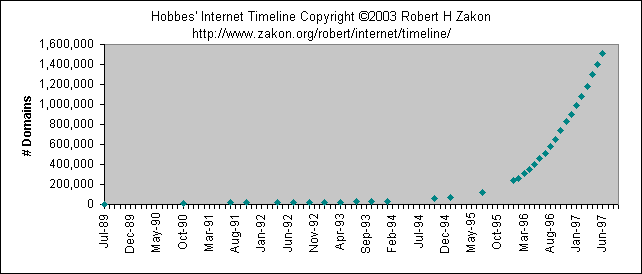
Figure: Internet Networks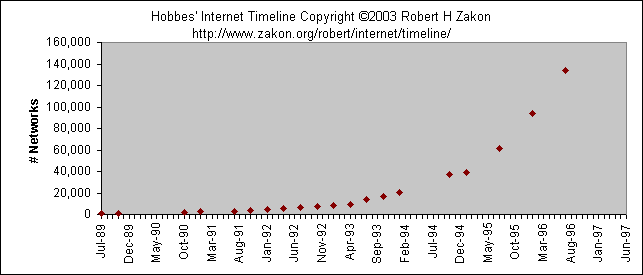
Worldwide Networks Growth: (I)nternet (B)ITNET (U)UCP (F)IDONET (O)SI
____# Countries____ ____# Countries____ Date I B U F O Date I B U F O ----- --- --- --- --- --- ----- --- --- --- --- --- 09/91 31 47 79 49 02/94 62 51 125 88 31 12/91 33 46 78 53 07/94 75 52 129 89 31 02/92 38 46 92 63 11/94 81 51 133 95 -- 04/92 40 47 90 66 25 02/95 86 48 141 98 -- 08/92 49 46 89 67 26 06/95 96 47 144 99 -- 01/93 50 50 101 72 31 06/96 134 -- 146 108 -- 04/93 56 51 107 79 31 07/97 171 -- 147 108 -- 08/93 59 51 117 84 31
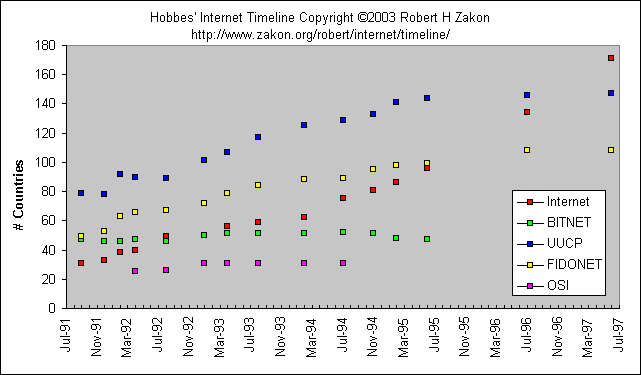
Domain Name Registrations:
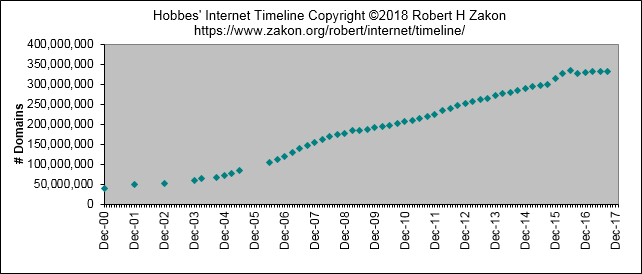
Internet Hosts:
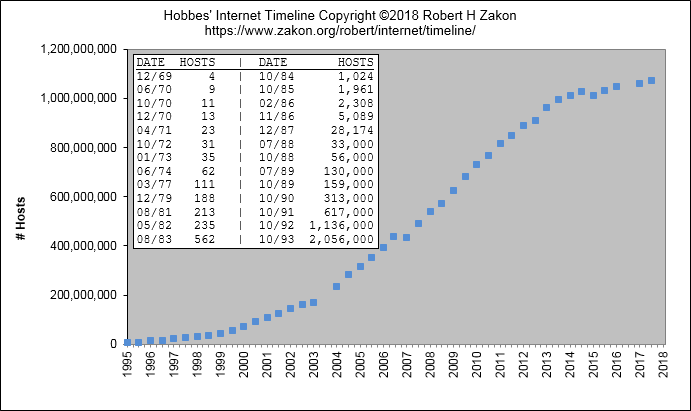
click here for a chart showing the logarithmic growth of the Internet
WWW Growth:
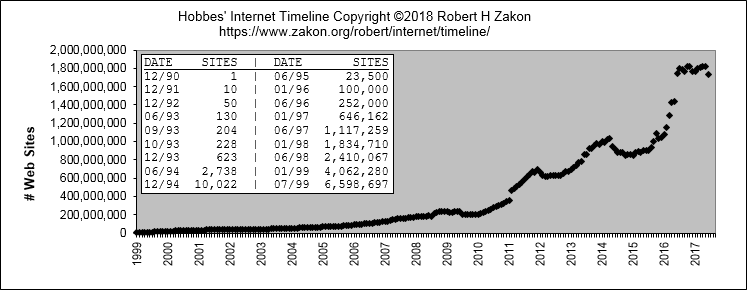
click here for a chart showing the logarithmic growth of the Web
Sites = Number of web servers (one host may have multiple sites by using different
domains or port numbers)
Notes on causes of signifant increases/drops:
- Feb'09 increase likely due to 20M new Chinese sites served by qq.com
- Aug'09 drop likely due to domain expiry at The Planet, including 5M .pl domains
served from one IP alleged to be a linkfarm
- Jan'10 drop likely due to qq.com blogs no longer being publically listed
- Jul-Aug'12 drop caused by removal of several wildcard hostnames with similar content
- Sep'12 drop caused by large network of linkfarmed domains disappearing from under the .com TLD
- Nov'14-Jan'15 drop largely caused by parked websites, with half attributed to a single IP ceasing to host them
Facebook Growth:
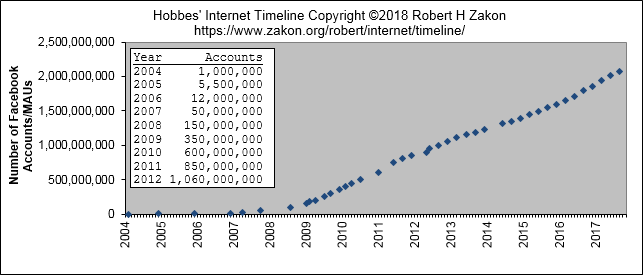
USENET Growth:
Date Sites ~MB ~Posts Groups | Date Sites ~MB ~Posts Groups
---- ----- --- ------ ------ + ---- ------- --- ------ ------
1979 3 2 3 | 1987 5,200 2 957 259
1980 15 10 | 1988 7,800 4 1933 381
1981 150 0.05 20 | 1990 33,000 10 4,500 1,300
1982 400 35 | 1991 40,000 25 10,000 1,851
1983 600 120 | 1992 63,000 42 17,556 4,302
1984 900 225 | 1993 110,000 70 32,325 8,279
1985 1,300 1.0 375 | 1994 180,000 157 72,755 10,696
1986 2,200 2.0 946 241 | 1995 330,000 586 131,614
~ approximate: MB - megabytes per day, Posts - articles per day
Security (CERT/US-CERT) Stats:
Date Incidents Advisories Vulnerabilities Tech Alerts ---- --------- ---------- --------------- ----------- 1988 6 1 1989 132 7 1990 252 12 1991 406 23 1992 773 21 1993 1,334 19 1994 2,340 15 1995 2,412 18 171 1996 2,573 27 345 1997 2,134 28 311 1998 3,734 13 262 1999 9,859 17 417 2000 21,756 22 774 2001 52,658 37 2,437 2002 82,094 37 4,129 2003 137,529 28 3,784 2004 3,780 27 2005 5,990 22 2006 8,064 39 2007 7,236 42 2008Q1-3 6,058 29
Hobbes' Internet Timeline FAQ
- 1. How do I get Hobbes' Internet Timeline?
- The Timeline is archived at http://www.zakon.org/robert/internet/timeline/. There are no authorized mirrors for the Timeline.
- 2. Is the Timeline available in other languages or editions?
-
- Chinese (Big5) by Tony Mao
- French by Didier Mainguy
- German by Michael Kaul
- Hungarian by Zsolt Boros
- Japanese (PDF) by Katsunori Tanaka
- Korean by Keonho Lee, KNIC
- Persian / Farsi (PDF) by Rahi Moosavi
- Portuguese by Simone Villas Boas
If you are interested in translating to another language or format, email me first
- 3. Can I re-print the Timeline or use parts of it for ... ?
- Drop me an email. The answer is most likely (though don't assume) 'yes' for non-profit use, and 'maybe' for for-profit; but to be sure you are not going to break any copyright laws, drop me an email and wait for a reply. Also, please note that I get a bunch of requests with improperly formatted return email addresses. If you don't hear from me in a week (typical turn around is < 1 hour), check your header and email again. BTW, don't forget to tell me who you are, your affiliation and how you plans to use the Timeline; anonymous copyright requests will not be granted.
- 0. Peddie (Ala Viva!), CWRU (North Side), Amici usque ad aras (PKP OH-EP), Colégio Andrews (Rio), Gordonstoun (Elgin)
- E-mail me if you know
Sources
Hobbes' Internet Timeline was compiled from a number of sources, with some
of the stand-outs being:
Cerf, Vinton (as told to Bernard Aboba). "How the Internet Came to Be."
This article appears in "The Online User's Encyclopedia," by Bernard Aboba.
Addison-Wesley, 1993.
Hardy, Henry. "The History of the Net." Master's Thesis, School of
Communications, Grand Valley State University.
http://w2.eff.org/Net_culture/net.history.txt
Hardy, Ian. "The Evolution of ARPANET email." History Thesis, UC Berkeley.
http://www.livinginternet.com/References/Ian%20Hardy%20Email%20Thesis.txt
Hauben, Ronda and Michael. "The Netizens and the Wonderful World of the Net."
http://www.columbia.edu/~hauben/netbook/
Kulikowski, Stan II. "A Timeline of Network History." (author's email below)
Quarterman, John. "The Matrix: Computer Networks and Conferencing Systems
Worldwide." Bedford, MA: Digital Press. 1990
"ARPANET, the Defense Data Network, and Internet". Encyclopedia of
Communications, Volume 1. Editors: Fritz Froehlich, Allen Kent.
New York: Marcel Dekker, Inc. 1991
Internet growth summary compiled from:
- Zone program reports maintained by Mark Lottor at
Note: A more accurate host counting mechanism was used starting
with 1/98 count. Now available at: http://www.isc.org
- Connectivity table maintained by Larry Landweber at:
ftp://ftp.cs.wisc.edu/connectivity_table/
- ARPAnet maps published in various sources
Domain name registrations compiled from Verisign reports.
WWW growth summary compiled from:
- Web growth summary page by Matthew Gray of MIT:
http://www.mit.edu/people/mkgray/net/web-growth-summary.html
- Netcraft at http://www.netcraft.com/survey/
USENET growth summary compiled from Quarterman and Hauben sources above,
and news.lists postings. Lots of historical USENET postings also provided
by Tom Fitzgerald (fitz@wang.com).
CERT growth summary compiled from CERT reports at ftp://ftp.cert.org/
CERT stats are also now being made available by CERT at
http://www.cert.org/stats/cert_stats.html
Many of the URLs provided by Arnaud Dufour (arnaud.dufour@hec.unil.ch)
Country-specific Internet Histories:
- Australia - "Origins and Nature of the Internet in Australia " by Roger Clarke
http://www.rogerclarke.com/II/OzI04.html
- Australia - "It Started with a Ping" by Jennie Sinclair
http://www.anu.edu.au/people/Roger.Clarke/II/Anniv.html
- Finland - "History of the Internet in Finland"
http://www.isoc.fi/internet/internethistory_finland.html
- Russia - "Chronology of the Russian Internet: 1990-1999"
http://www.zhurnal.ru/staff/gorny/texts/ru_let/
- UK - "Early Experiences with the ARPANET and INTERNET in the UK" by Peter Kirstein
http://nrg.cs.ucl.ac.uk/internet-history.html
Additional books of interest:
- "How the Web Was Born - The Story of the World Wide Web"
by James Gillies and Robert Cailliau
- "Weaving the Web : The Original Design and Ultimate Destiny of the World Wide Web
by its Inventor"
by Tim Berners-Lee
- "Where Wizards Stay Up Late: The Origins of the Internet"
by Katie Hafner & Matthew Lyon
- "Nerds 2.0.1: A Brief History of the Internet"
by Stephen Segaller
- "Architects of the Web: 1,000 Days That Built the Future of Business"
by Robert H. Reid
- "Netizens: On the History and Impact of Usenet and the Internet"
by Michael Hauben et al
- "Exploring the Internet: A Technical Travelogue"
by Carl Malamud
Early works of interest:
- "As We May Think" by Vannevar Bush, 1945
http://www.theatlantic.com/unbound/flashbks/computer/bushf.htm
- "Man-Computer Symbiosis" by J.C.R. Licklider, 1960
http://apotheca.hpl.hp.com/ftp/pub/DEC/SRC/research-reports/abstracts/src-rr-061.html
---
Contributors to Hobbes' Internet Timeline have their initials next to the
contributed items in the form (:zzz:) and are:
ad1 - Arnaud Dufour
amk - Alex McKenzie
bb1 - Billy Brackenridge
bt1 - Brad Templeton
clg - C. Lee Giles
db1 - Dave Belson
dhr - David H. Rothman
dk1 - Daniel Karrenberg
ec1 - Eric Carroll
esr - Eric S. Raymond
feg - Farrell E. Gerbode
gb1 - Gordon Bell
gck - Gary C. Kessler
glg - Gail L. Grant
gmc - Grant McCall
gst - Graham Thomas
irh - Ian R Hardy
jap - Jean Armour Polly
jg1 - Jim Gaynor
jtl - Jon Leighton
kf1 - Ken Fockler
kf2 - Kinming Fung
lb1 - Larry Backman
lhl - Larry H. Landweber
mpc - Mellisa P. Chase
msb - Majorie S. Blumenthal
msh - Michael S. Hart
par - Pierre A Renaud
pb1 - Paul Burchard
pds - Peter da Silva
ph1 - Peter Hoffman
rab - Roger A. Bielefeld
rm1 - Rahi Moosavi
sc1 - Susan Calcari
sk2 - Stan Kulikowski - see sources section
sw1 - Stephen Wolff
tb1 - Tim Burress
tp1 - Tim Pozar
vgc - Vinton Cerf - see sources section
wz1 - W. Zorn
zby - Zenel Batagelj
Archive-name: Hobbes' Internet Timeline Version: 25 Archive-location: http://www.zakon.org/robert/internet/timeline/ Last-updated: 1 January 2018 Maintainer: Robert H'obbes' Zakon, timeline@Zakon.org, www.Zakon.org Description: An Internet timeline highlighting some of the key events and technologies that helped shape the Internet as we know it today.
参考另外的时间线
https://www.timetoast.com/timelines/history-of-the-internet--328
https://groups.csail.mit.edu/ana/Publications/PubPDFs/The%20past%20and%20future%20history%20of%20the%20internet.pdf
https://www.lk.cs.ucla.edu/data/files/Kleinrock/An%20Early%20History%20Of%20The%20Internet.pdf
https://www.timetoast.com/timelines/history-of-the-internet--328
https://www.academia.edu/378261/Who_is_the_Father_of_the_Internet_The_Case_for_Donald_Davies
https://www.computerhistory.org/internethistory/
https://www.computerhistory.org/internethistory/1960s/
https://datatracker.ietf.org/doc/html/rfc2555 rfc30周年
https://en.wikipedia.org/wiki/Jon_Postel
https://datatracker.ietf.org/doc/html/rfc5540 (RFC四十周年)
https://tools.ietf.org/html/rfc8700 (RFC五十周年)
https://www.computerhistory.org/internethistory/1960s/
